#just a comic about how the desire to be seen and shown love and compassion unites us all
Text
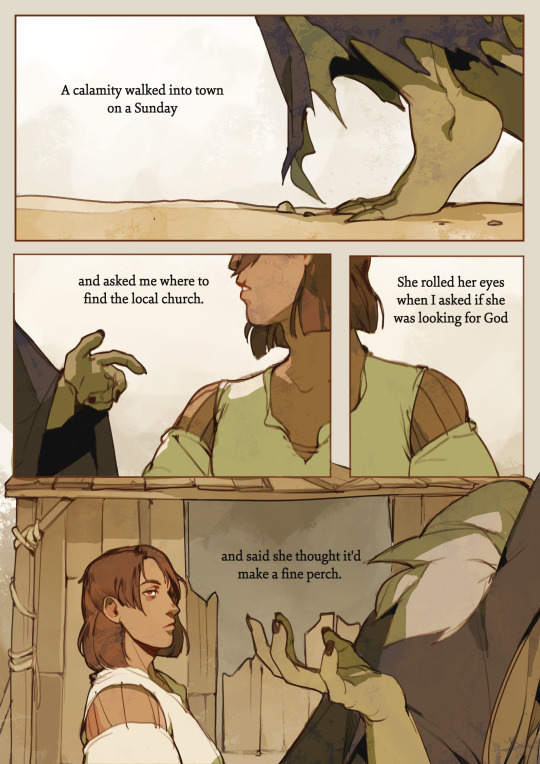
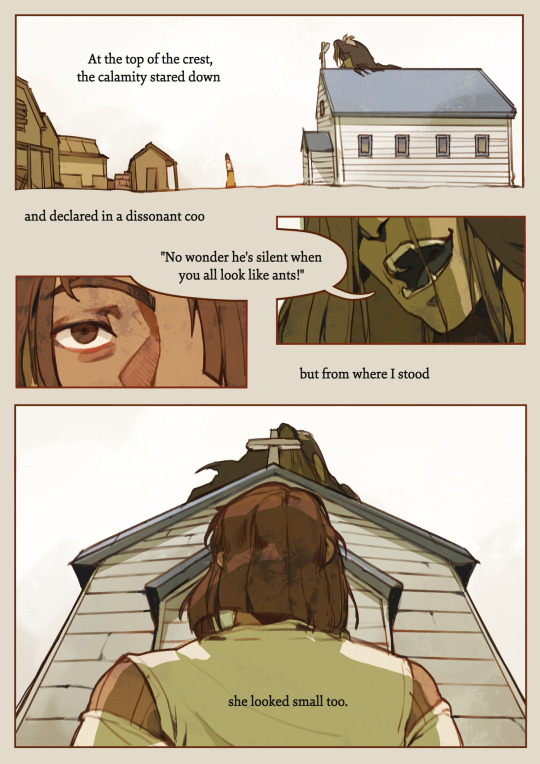
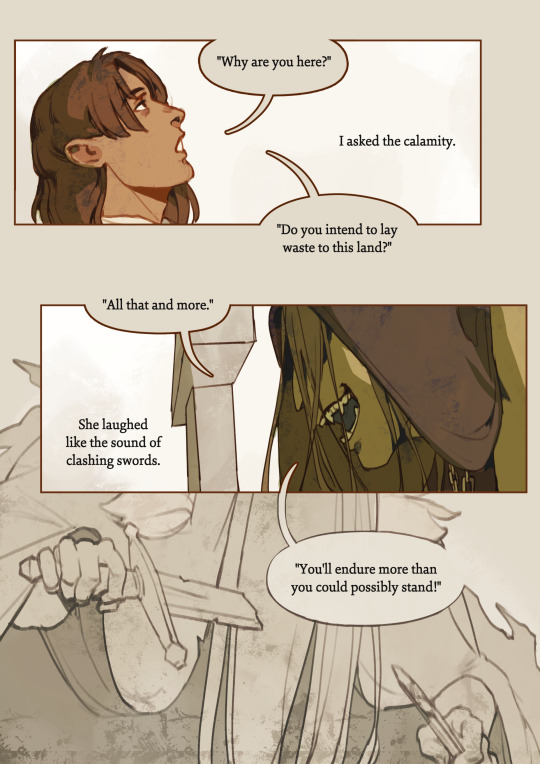
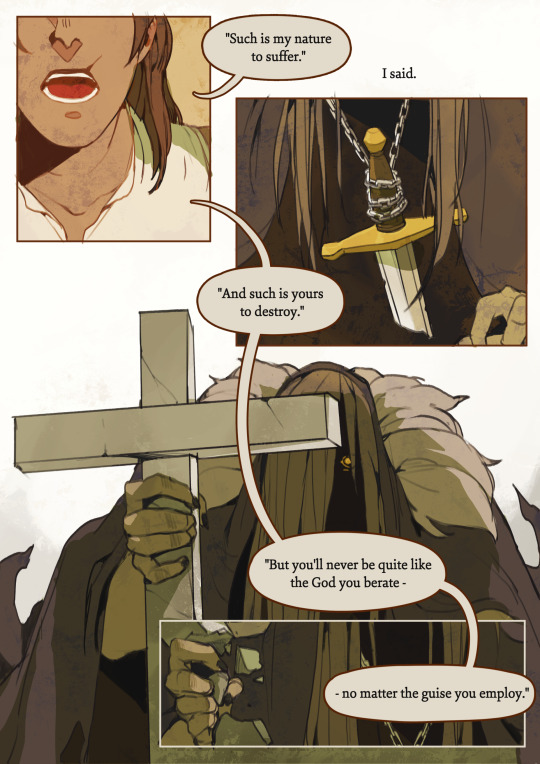
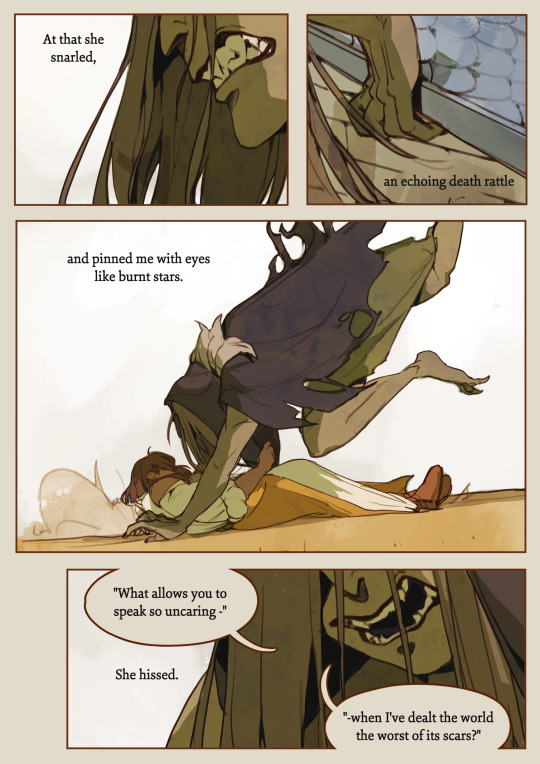
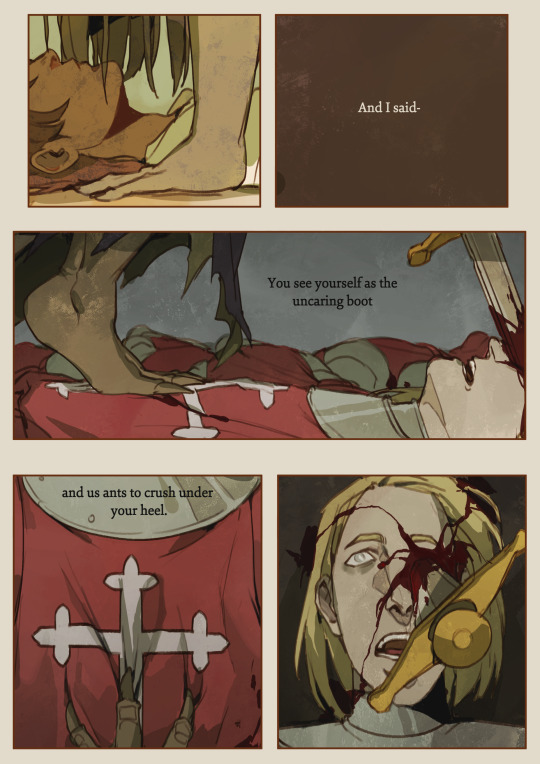
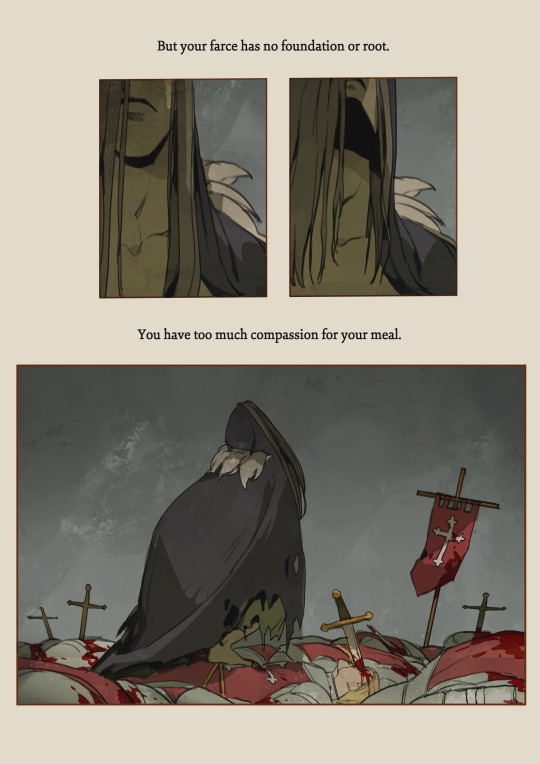
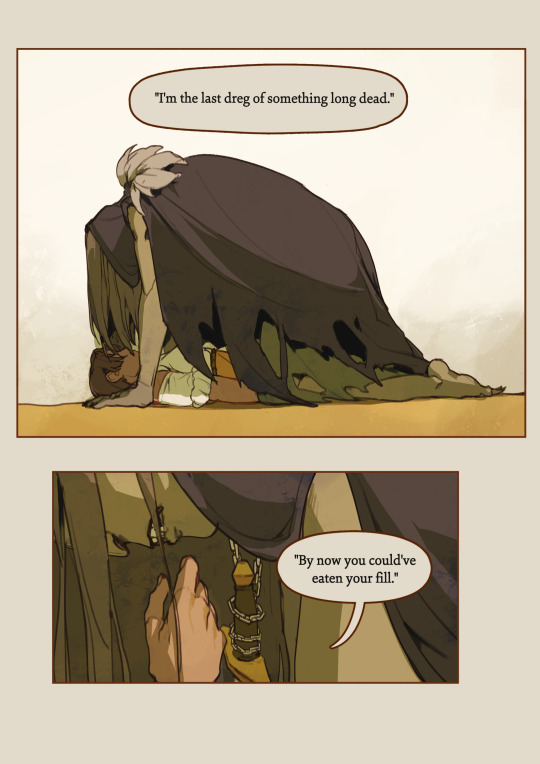
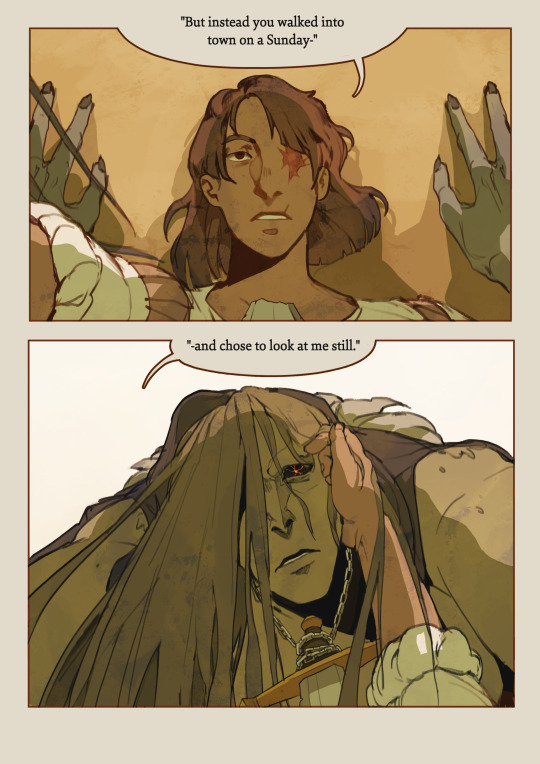
the calamity.
a comic about being seen.
--
creative notes:
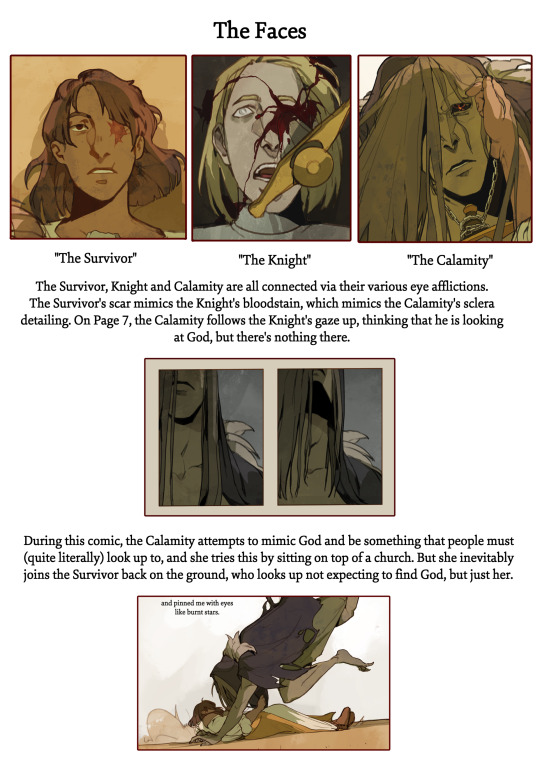
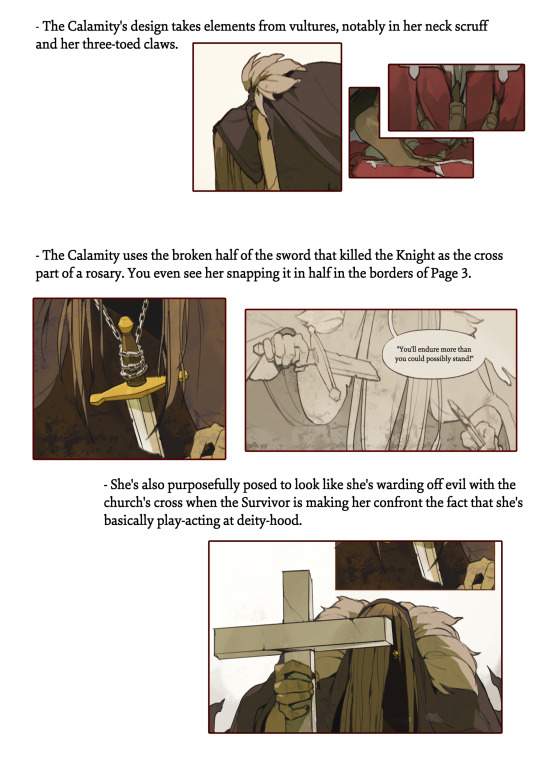
--
all my other comics
store
#cw: blood + eye scarring#oh the inherent intimacy of seeing and being seen#just a comic about how the desire to be seen and shown love and compassion unites us all#also big scary monster lady pretty#girl power! the personification of disaster and strife uses she/her pronouns!#i also feel somewhat obligated to mention here that i dont have anything against christianity as a whole#i just think the concept of God is interesting#i went to a christian school for 12 years im allowed to make this comic#comic art#sapphic#yes. interpret the subtext#stillindigo art#heartearters#thats the name of the anthology this will belong to. whenever i finish it#stillindigo comics
25K notes
·
View notes
Note
Been thinking about Ghost in the Machine again, and I think what makes it so effective as a horror story isn’t simply the conceit of the plot itself, but that fact that it’s a familiar plot that’s been twisted into something readers will register as “wrong.”
Because we’ve seen “Victim trapped in/being corrupted by the void” before, we’ve seen “Orange discovering his powers” before, heck we’ve even seen “Orange using his powers to rescue Victim from the void” before. But those last two have always been presented as good things, to be happening. We want Orange to learn about his powers, we want Victim to be rescued from the void, we want Orange and Victim to be friends.
This comic gets us the same way that its Victim gets its Orange; by luring us in with familiar wholesomeness and then twisting that familiarity back on itself in the ugliest way until it’s almost unrecognizable. To me, the horror comes not from isolated sources in elements such as the betrayal or the void-corruption or the abandonment, but from the realization that what we wanted…was wrong.
Because, like Orange, we’re earnest. We see the ways it can go badly, but we want so strongly for it to go well, we’re so used to it going well, that we don’t heed the danger signs.
And as a reader, that fascinates me.
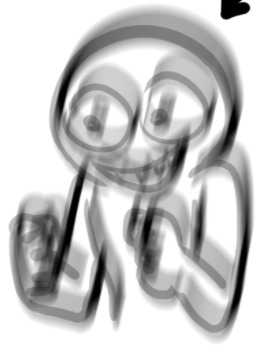
Inks I am giving you the firmest of handshakes and I'm tucking you into bed with a cup of your favorite nighttime beverage because
YES
I adore your analysis of the Ghost Machine comic
You pretty much put into words the inherent uneasiness and horror vibe I wanted to comic to have
It's the dichotomy of fandom tropes that have almost always been shown as a positive thing contrasting the very horrible nature of this story
(Oops- Sammy got too passionate about their own story and ended up writing a wall of text dissecting character actions and motivations alskdjlgsjsgs)
My favorite types of horror are ones where the characters feel realistic. Everyone's actions have some sort of human reasoning behind it and as a reader, you can understand why they would do something like that.
Orange isn't a clueless idiot. They don't just happen to keep interacting with Victim by chance. They want to help Gray because they care about them. They see them as a friend. But it's that very same compassion that ends up sealing their fate. It's also that compassion that prevents them from fully reaching out to the rest of the Color Gang.
Multiple times we see Orange try to bring up the notion that they might have powers but because those powers are so heavily connected to the events of AvA 5, it poses a problem since that event triggers bad memories for RYGB.
Orange is kind and empathetic to a fault. How do you ask questions about something when that thing causes panic attacks for the person you're asking? For Orange, that means not bringing it up, ever.
And I don't blame Yellow or the rest of the Color Gang for it either. Watching the people you love get disintegrated into specks is traumatizing. If I was in their shoes, I also wouldn't want to talk about it.
Even Victim, I can sympathize to a degree with. What they did is inexcusable and evil, but at the same time, I get it. There's something so horribly human about their desire to live and the actions they take to ensure it. They've been trapped in isolation for years with the Void slowly draining them away. The last "interaction" prior to Orange was literally them fighting and losing their life against the Cursor. Whatever social skills or common sense they could have had in the 5 minutes they were alive are basically nonexistent by the time Second comes along.
It might not have been as easy to read in the background of Pt 7, but essentially, the only reason Victim was even able to last this long in the Void was because they were siphoning bits of power from Chosen and Dark without the pair knowing. Even with the bits of energy from them, it wasn't enough to fully negate the corruption of the Void.
The Void Takes
And eventually, it would fully take Victim.
And then Dark, dies. (Or at least gets taken out of commission to the point that Victim no longer can take from him) That's HALF of Victim's way of staying alive.
In its place, is a new power. Something overflowing with energy. Its enough to not only just stay alive but it could be enough to live.
After years of isolation and the desperate desire to just survive, when an opportunity like this comes along, wouldn't you also take advantage of it?
I can't say with full confidence that I wouldn't.
Sometimes, the scariest thing is the length people will go to stay alive.
#GOOD LORD THIS IS A WALL OF TEXT#OOPS#I GOT WAY TO INVESTED IN MY OWN STORY#Sammy8D answers#inksandpensblog#A Ghost in the Machine#Ghost Machine post comic talk#Sammy8D Stick Stuff
43 notes
·
View notes
Text
Zuko deserved better
So I rewatched Avatar the Last Airbender recently and let me tell you......
I wanna murder several people.
Looking back on this entire series I’ve come to notice something. I watched the show just like any other audience member and only saw the good and the bad characters. One of these prime examples is Zuko. Zuko’s redemption arc has been praised as one of the greatest in history, succeeding where others have failed. But watching it all again......it wasn’t redemption. Not to me personally.
Before everyone gets angry and defensive at me, please finish reading my post and hear what I have to say. I do not wish to start any fandom wars or discredit or disrespect anyone’s opinion, this is just my personal psychological analysis of Zuko’s character....Sigh and let me give you a warning.
It’s gonna be LONG.
So if you’re not interested or don’t want to hear it or don’t feel like reading something this long that’s fine, you can go ahead and just click away and ignore this post.
Starting from book 2.
Now you may be wondering why I’m starting here and not from the start of Zuko’s childhood but I first want to address the one question everyone had been wondering since the series 2 finale. What would have happened if Zuko hadn’t sided with Azula?
My answer is.....that wouldn’t have happened.
Everyone’s been focusing on the entire arc where Zuko was struggling to accept that the war was wrong and how Iroh was trying to get through to him when he tried to capture Appa and afterwards, but here’s something everyone tends to ignore.
Why didn’t Iroh try sooner?
Why didn’t he try to stop Zuko before Aang came, before he’d gotten so deep and desperate to the point that he continuously committed heinous acts to capture the Avatar? People would justify it by saying Iroh wanted Zuko to realize the wrongs of his father and Nation by himself to shape him into his own person. But that is in no way the appropriate way to approach a physically, psychologically and mentally unstable and abused child. Zuko was a thirteen year old boy when he was burned and banished. This is where we go into his childhood. Zuko was raised like any other Fire Nation citizen. As we’ve seen in book 3 and in the Pirate comic book, The Fire Nation citizens were led to believe that the other Nations were ‘savages’ and ‘barbarians’. It villainizes the Fire Nation even more. The very fact that they would spread heinous lies against other people when they themselves were responsible for the war that ruined so many lives. But when you realize, what Sozin and the other Fire Lords did was a solid battle tactic. Making the opposing side out to be these horrendous monsters. Making lies or accentuating every one of their worst traits to dehumanize their enemies so that the people would not have any qualms about fighting them. All of the Fire Nation schools were taught these lies. And Zuko was no exception.
Zuko was a member of the Royal family. And from what was shown in the Avatar series, the Royal family was isolated from the rest of Fire Nation society. Zuko had no way of knowing what the other Nations were really like, no way of knowing the truth about the war and no one had bothered to explain it to him. The one person that could have, did NOT. And yet people had expected him to just automatically know that he was being lied to and that his people were the villains. Zuko’s only social exposure was with Fire Lord Azulon, Fire Lord Ozai, Dragon Of The West General and Crown Prince Iroh, his cousin Prince Lu Ten, his mother Princess Ursa and his younger sister Princess Azula and her friends Mai and Ty Lee. All of whom believed in the Fire Nation propaganda and all of whom had no problem in participating in the war and making jokes about burning Ba Sing Se to the ground. Zuko was under scrutiny and aggression from Ozai. Ozai was Zuko’s ‘handler’, his ‘groomer’. He groomed Zuko into a certain type of submissive and obedient behavior. Zuko was not allowed to show any type of emotion otherwise he would suffer severe repercussions. Ozai and Azula taunted Zuko for having a sense of compassion and with how he was ostracized in a war loving family, he began to believe his behavior and way of thinking was unusual. It was like Azula said to Mai, “Your mother had certain expectations of you and when you strayed from them you were shot down.” In Zuko’s case, the expectations he strayed from resulted in severe punishment. Ozai was willing to permanently disfigure and traumatize Zuko when he was a thirteen year old boy. It’s not unusual to think that his punishments towards Zuko would sometimes very likely be physical and many people even write alternate universes of the Avatar series where Ozai was even more abusive than he already was. He was a manipulative man who brainwashed his daughter into being his perfect, obedient little slave and manipulated his son into questioning his own sense of reality. He would tell him that Azula was born lucky and he was lucky to be born, cementing Azula’s view of herself of receiving everything she wanted and turning her personality toxic while he made Zuko feel inferior and faulty. If there was something wrong with him, his father would tell him and he needed to fix it. But he never could. He strayed towards his mother, who like Iroh, abandoned Azula because of Ozai’s manipulation and did nothing to help her like they ‘helped’ Zuko.
When Zuko was thirteen he wanted to ‘prove’ himself to his father by attending one of his war meetings. Zuko very likely only wished to do what his father wanted because by then, Iroh had abandoned him when he left after the Siege of Ba Sing Se, his mother disappeared and his grandfather and cousin were both dead. The only ones he had left of his family were his father and sister who both abused him and he only wished for their approval and their affection. Humans need mutual affection. Children who do not receive affection from their parents, tend to not take that type of neglect well. Because people need affection to properly function. Our parents love us from when we are young and that emotional connection is something very important to every human being’s mental state. However, Zuko’s only source of affection, his mother, was taken away from him. Azula herself, had no source of affection. Not from her mother, who thought she was demented from her father’s brainwashing, nor from her brother who feared her, nor from her father who used her as a tool. Returning to the day of the Agni Kai, Zuko wished to be of use to his father, he craved his affection because that is what the abuser does. They make you believe they are the only ones who can validate you and if you do not abide by their rules or follow their orders then you mean nothing. Zuko for the most part from what I could see in the flashback, held his promise and did not speak. But when he refused to back down when his people were in danger, Ozai was not pleased. This is because he is an abuser. He is Zuko’s ‘handler’ and when someone who is abusing another person witnesses this type of behavior, they have a feeling of loss of control. They desire control, they crave it, over the abusee especially. So when Zuko showed empathy towards the Fire Nation citizens and did not do as Ozai wished, he decided to ‘rectify’ that. In the most BRUTAL way possible. An Agni Kai. A public spectacle where he would establish dominance over his son, over his pawn and he would make a show of it. He would show everyone that HE was the one in control and NO ONE could defy him. When Zuko refused to fight Ozai, because of his love for his father, Ozai only saw that as a weakness. Ozai is a psychotic man. The fact that he did not have any problem in burning his son so cruelly shows that he does not have any sense of morals. Going back to Zuko, a thirteen year old child at the time, he had just been punished for disobedience, for straying from his father’s expectations, in the worst way possible.
Zuko did what many people would say is the right thing to do. He tried to defend his people from a cruel man intent on sending them to their deaths. But in doing so, he had defied his father and was punished for it. He was punished....for trying to HELP people. His life was essentially DESTROYED and he was thrown out of his home...for trying to help people. For showing empathy towards others. He was punished in the worst way possible for defying his father. His entire perception of right and wrong was thrown out of balance. He was taught that the war was right and that the Fire Lord, his father, was all knowing. And his mother tried to teach him kindness and her lessons of kindness got him punished. The amount of physical and mental damage he had sustained from such a punishment would in some cases be irreversible. Iroh was right there with Zuko and he did nothing. I CAN understand why he did not step in during the Agni Kai. He had been gone from the Fire Nation, his brother had taken the throne and he could have very well himself been punished severely for intervening. However, why did he allow Zuko to continue to believe he was the one at fault? Everyone of us has seen Zhao, has seen the way he treated Zuko during his banishment. Zuko very likely spent those entire two years before Aang’s arrival, being subjected to that type of behavior from everyone around him. All of them blamed him, all of them very likely said that he’d deserved what had happened to him. No one was on his side. He ended up turning aggressive and cruel towards others, because that was the way his father behaved and it was his empathy towards others that got him punished in the first place. He said in The Storm ‘the safety of the crew doesn’t matter’, just like the general that called the 41st division ‘fresh meat’. It was easier for Zuko to lash out at others and be aggressive than to let them see his vulnerabilities and hurt him for them again. It was the same with Song and her mother. Ozai tried to force him to be cruel, he tried to groom him the same way he did Azula. They dehumanized the other Nations and Zuko behaved the exact same way he was expected to. ‘Their compassion would cost them’. It was exactly the way his father wanted him to be. It was what Iroh did not wish for him, and yet despite claiming he thought of Zuko as a son, he did not in any way try to convince Zuko to give up his quest during the two years he had been searching for something that at the time was believed did not exist. The only instance we were shown of Iroh saying anything against his search, and even that is a stretch, was in the Western Air Temple episode where Zuko has a flashback of Iroh telling him that ‘destiny was a funny thing’ when Zuko said it was his destiny to capture the Avatar. Iroh had time to run the White Lotus, an antiwar organization for two YEARS maybe even longer and he did not think of taking two MINUTES to talk to Zuko, to ease him into realizing the wrongs of the war. Okay, yes he could have passed it off as character growth. But how do you expect a person, surrounded by people telling him he was at fault, he had no choice, either obey or never come back, to realize something like that? How do you expect an abuse victim to accept help all by themselves when their abuser forces them to depend on them? Did Iroh take him to some Earth Kingdom villages to see that they aren’t the vicious savages the Fire Nation portrays them to be? Did he take Zuko to the Southern Water Tribe to see the damage done to them at the hands of his own country? No. Instead he acted like an oblivious old man who had no interest other than Pai Sho and speaking proverbs that Zuko could not hope to understand.
Two years Zuko spent looking and looking and he turned desperate to the point that he was willing to do anything to go home. And then The Avatar finally returned. And then the people that Zuko was raised to perceive as brutal savages continued to stand in his way. And did Iroh intervene? No. He still did nothing. He allowed Zuko to continue his pursuit and turn into the worst possible version of himself. People say that Zuko should own up to the consequences of his actions. And he should. But would he have done those actions had Iroh stopped him earlier? Would he have done any of the things he did when the only remaining adult figure in his life had told him otherwise? Would he have listened to Iroh? The answer is yes. He was willing to do what Ozai had expected of him so why would he not listen to Iroh with time and patience instead of waiting till the last possible moment to do so? Children don’t automatically know right from wrong from the moment of their birth. They are taught by their parents, by the adults in their lives and Zuko had Ozai as his parental influence. And Iroh knew that. He knew the type of man his brother was and he did not try to overwrite his brother’s abuse to help his nephew until Zuko was already on the path of no return. When they became refugees Iroh still did nothing until they got to Ba Sing Se and until Zuko, again in an act of desperation, tried to capture Appa. That was when he FINALLY decided to step in. Three years since Zuko’s banishment, sixteen years of his father’s influence and abuse and he decides the very moment his nephew is close to the brink of insanity is the perfect opportunity to DESTROY his entire world view. He had worked day in and day out for two years before Aang appeared, only for his uncle, someone he TRUSTED, to tell him it was all for NOTHING. Two years of TORTURING himself. A year of fighting against his Nation’s enemies and SUDDENLY he’s being told it was all for nothing. When Iroh and Zuko reunited, Iroh told him he found his way again ‘on his own’ like how Zuko told Ozai he had to learn everything ‘on his own’. And they were both right. Zuko had no one to help him. He had to suffer through so much on his own, without anyone’s help and they’re SURPRISED he acted the way he did. When everything came to ahead in Ba Sing Se with Katara, people thought ‘Oh Zuko has changed he’s going to help Katara.’ And when he did not they HATED him for it.
The reason for this is because Katara was the ‘good guy’ and Zuko was the ‘bad guy’. Black and white. Katara and Zuko shared a moment of understanding from both losing their mothers and Katara offered to heal his scar and he chose to side with Azula and both Katara and the viewers saw this as a betrayal on Zuko’s part. This assumption however is completely unjustified and unfounded. Everyone sees Zuko and the Fire Nation as the bad guys. The villains of the story. But Katara and the Water Tribes and Earth Kingdom were the bad guys in the Fire Nation’s eyes. Katara was the ‘savage’ standing in the way of Zuko going home. The Avatar was his home’s greatest ENEMY and THREAT. Had the situation been reversed and Katara had to choose between Zuko and the Water Tribe and her brother and father, people would have supported her choice because they were the good guys. Zuko’s people were the bad guys so it had to be the wrong decision and a betrayal to Katara and Iroh. But Zuko was an unstable, traumatized child who did not wish to believe his people were bad, who did not want to fight his home after he spent so long trying to capture Aang, his home’s greatest THREAT and ENEMY. Katara hated Zuko because he represented everything that the Fire Nation did to her family. And Zuko hated her because she was the ‘savage’ keeping him from his one way home. To Zuko, Katara was the bad guy. And looking back at their moment of sympathy where Katara said he betrayed her trust I can only ask one thing....how could Zuko have known that Katara wasn’t trying to trick him? Now, the viewers would automatically respond ‘Katara’s not like that! She wouldn’t do that!’ but the fact is, we the viewers KNOW Katara. We know she’s not that type of person because we got to know her through out the series. Zuko does NOT know her. To Zuko, she’s just another faceless enemy out to KILL his father. He chose Azula’s side because he could not accept what Iroh was saying to him because why hadn’t Iroh said so sooner? He did not want to join Aang’s side cause this was the AVATAR. The one out to KILL his FATHER and take down his HOME. When Zuko returned, he was conflicted about what he had done because he had begun to see how wrong his father and sister’s behavior and The Fire Nation’s war truly was. And Iroh cemented that further by proclaiming Zuko’s struggle was because of Roku and Sozin’s conflict when that was clearly not the case. Zuko was groomed and brainwashed by the Fire Nation propaganda like every other citizen but he was not dispelled from that belief by anyone. No one tried to make him question that belief. Iroh did not try to ‘help Zuko’ until the very last moment in Ba Sing Se. People believe Zuko betrayed Iroh because that’s how it’s supposed to be when Zuko was the ‘bad guy’ and Iroh was the ‘caring’ Uncle and ‘voice of reason’. And yet he did not think to ‘reason’ with Zuko before this entire mess even started. He did not in any way try to disrupt Zuko’s view of the other Nations or his father. In my opinion, IROH was the one who betrayed ZUKO. Iroh KNEW the entire time that what Zuko was doing was wrong. Zuko was a child who was not allowed to think for himself and Iroh KNEW Zuko was brainwashed by the exact same propaganda he himself had believed before he lost his son. If Iroh, who had believed in the Fire Nation for so many years, was unable to realize the wrongs of the war until his ADULTHOOD when he lost his son, how in the world did he expect a 13 year old child to do so? And Zuko became even more unstable and then he chose the Fire Nation.
When he realized it was wrong and went to join team Avatar, they were reasonably mistrusting.
Zuko’s redemption arc from a simple perspective, from team Avatar’s perspective was very well done. Team Avatar did not know what Zuko had been through. To them he was just another Fire Nation monster who had hurt them. To the audience, he was just another Fire Nation monster who had hurt the good guys. No one would think that deep into a fictional character’s perspective or psychological and mental state. No one would think past the ‘good guy’ and the ‘bad guy’. But one thing I cannot justify is Katara’s accusation of betrayal towards Zuko. As we have mentioned, Zuko and Katara were enemies who had a mutual hatred towards each other before his ‘redemption’. They had one single moment of shared empathy and understanding and that is NOT the basis for earned trust. What would Katara have done had she been in Zuko’s shoes? Fighting her enemies, fighting people she sees as nothing more than monsters and she has to choose between her long time enemy and her sibling and her home and her family. If she was in that position, she would choose Sokka and Hakoda and Aang and the Water Tribe over Zuko in a heartbeat because those are her FAMILY members and her FRIENDS and people would justify her because she’s the ‘good guy’. The hero. But Zuko is the villain so his actions automatically AREN’T justifiable. I understand Katara’s mistrust towards Zuko because of their history and because again, she doesn’t know anything about him or what he went through. But she cannot expect him to just automatically leave behind everything he’s ever known and ever believed in because of one single moment of understanding. Zuko should have done everything he could to make it up to the group because he owed it to them and they again, did not know any of his reasons for hunting them. But Zuko does not deserve to be labeled simply as ‘a bad guy turned good’ when he was NEVER a bad guy to begin with. When he was never even mentally stable enough to make that type of decision for himself. In today’s day and age Zuko and Azula would have BOTH ended up in a mental institution. And after all of the things he went through, Zuko was the one who ended up going back to Iroh and apologizing when Iroh was the one who abandoned him and then Zuko at 16 years old ended up as the leader of a nearly fallen apart country. He had to suffer through insomnia, assassination attempts and mental instability and abandonment. Iroh left to Ba Sing Se and only made two appearances in a total of SIX comic books after the end of the War and one of those was entirely brief. So while Iroh gets to enjoy the rest of his life selling tea, Zuko has to suffer the consequences for what his family did. He was also abandoned by Mai which brings me to another point.
Zuko’s toxic relationships.
Some people say they dislike Mai because she is emotionally abusive towards Zuko. It never occurred to me before but looking at it now, I have to say that I agree. In the comics after book 2 had ended it was shown that Azula used Mai’s childhood crush on Zuko to manipulate him into going back to the Fire Nation with her. And Mai.....I don’t even know how to get started on the entire mess that is their relationship. Mai is a person who does not like emotion. She doesn’t like to express herself and immediately shuts down anything even close to emotion. The same applies to Zuko. Zuko is a very emotionally unstable and insecure person. And instead of reassuring and calming him, Mai immediately cuts him off whenever he loses a handle of his emotions and just flat out ends their relationship on the spot. She gives Zuko no explanation, just gets angry at him and then all of a sudden when Zuko can’t take anymore and explodes she suddenly says she cares about him. Their relationship is toxic. Mai demeans his problems and things that trouble him. Quote “I just asked if you were cold, I didn’t ask for your whole life story.” when Zuko was nervous about going back home. She demeans his guilt towards Iroh and tries to make him feel better by ordering servants around. And then in the Boiling Rock episode she attacks him for his letter which is reasonable on her part, but there is the problem that despite being Zuko’s girlfriend, up until that point she was Azula’s subordinate first and foremost and she could have tried to let Azula know. Still was a shitty way of ending their relationship, I’m not gonna act like it wasn’t but I still wanted to put that perspective out there just for thought. Not to mention how she ended things in the comic books. The trust issue I understand. But I don’t understand how ONE single mistake would lead to her just immediately ending things instead of at least TRYING to work it out. She could have listened to him and seen why he was so upset and scared of messing up that he went to Ozai of all people for help. She did not stick by him when he needed her and that was what forever ruined their relationship for me.
In simple terms, Zuko was a bad guy who became a good guy and redeemed himself.
In psychological terms, Zuko was an abuse victim who was brainwashed since his childhood, blamed for it and made into a scapegoat while his sister ended up in a mental institution because of her father’s influence and because the same people who ‘helped’ Zuko didn’t think she deserved it too.
So from what I’ve seen while rewatching the series....
Zuko never needed redeeming. Zuko needed help.
And he didn’t get it.
#avatar the last airbender#zuko#zuko deserved better#azula#azula deserved better#zuko needs therapy#azula needs therapy
152 notes
·
View notes
Note
Hey! 👋🏼 I was looking at Tonys panel with Carol and his AA panels. It got me thinking how can a person like Tony .. who is an atheist, a believer of science and a confident engineer rely on AA which has a religious foundation (the 12 steps) and place so power on God. I know secular AA have different takes on it and encourage a personal definition of God as any higher power the person may choose. But doesn’t that defeat Tonys belief? Because I don’t think he believes in a higher power regardless if it’s a deity or not.
This is a wonderful question. There’s a lot of nuance to the answer, in my opinion, because I think there are some things called into question here that Tony (very realistically) treats with a lot of complexity.
Firstly, Tony’s atheism is kind of... I don’t want to say it’s up in the air, because at this point, I think it’s kind of made its place in canon and fanon both. But, most likely as a result of the times in which he was created, he has been shown in canon (at least in the early stages of his life) to follow some sort of organized religion. This is from Iron Man Vol. 1 #164, and it’s... not strong evidence for him being a spiritual man, as most people who call themselves “not that religious” tend to be religious by way of traditions, but. You know. It is what it is.
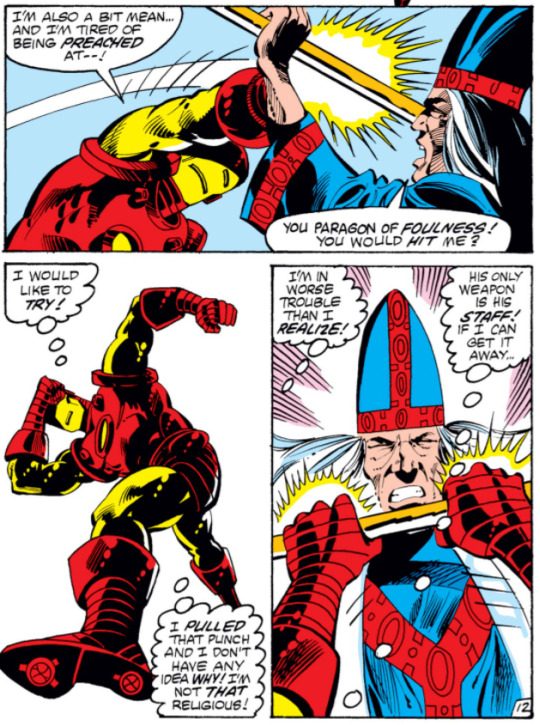
Of course, we could dismiss this as yet another thing that early canon imposed on a character who wouldn’t be like that at this point in time, but I think it brings up interesting beats in the way Tony’s character has progressed over the years.
Considering him as someone who may have been raised as traditionally religious makes sense in the context of defining events, as well, given that we watch him pray the Lord’s prayer in #14 of Iron Man Vol. 4, one of his Civil War tie-ins.
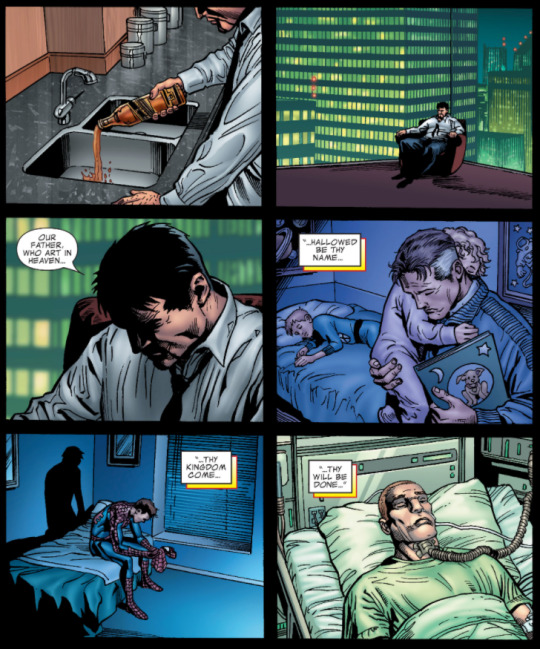
Given the proximity to the alcohol (and the point he’s at in the timeline, here), one could also easily assume that even if he had no religious background, the very presence of the Lord’s prayer in AA meetings could have formed a connection in his head between this “worship” and sobriety-- at the very least, enough of one that the prayer strengthens the effectiveness of his willpower. It seems the little push he needs to pour a drink down the drain is borderline Pavlovian.
There’s actually a lot of religious imagery in Tony comics in general. He’s a man with a suit facing conundrums of cosmic proportions. It’s difficult for him to keep rationale exclusively within the range of earthly probabilities.
Point is, his atheism doesn’t come from his disbelief in a higher power. It’s quite the contrary, actually. His atheism comes from a belief that there’s no single entity that could claim the title of God, that any being willing to try has, just by being, already forfeited the title.
Which is a fair assessment to make, given that he’s fought many people claiming to be Gods, and they’ve all bled. He’s also watched people worship Gods that turned out to not... really be Gods, whether they were otherworldly beings, his buddy Thor, or, uh, himself. The idea of him, at least. In space.
Because of course that happened.
But Tony actually does have a higher power to give himself up to in these meetings. In Civil War II #1, he very explicitly states it:

“I respect the future. I believe in the future. I worship at its feet.”
“The Future” to him is something he can affect, certainly, but he’s aware of just how massive it is, just how massive all of time is compared to the few decades he’ll spend on earth. This is his higher power, his cosmic deity of choice.
It can’t bleed. It can’t falter. It’s inevitable.
And this mindset is... pretty in line with everything else he’s done. He’s referred to himself as a “necessary monster.” He’s implied many times over that he thinks he’s rotten and potentially dangerous, but he’s also intelligent and capable and he wants to do the right thing, even if he doesn’t always know what that is.
If you’ve ever been in a religious environment, you’ll probably recognize his mindset going into any problem: there’s always a solution, always information he’s missing, always a “right choice” he’s looking for with a domino effect that’ll be as favorable as possible for future generations. He trusts in the future the way people trust in God, with an awareness that he’ll never have all the pieces to make sense of everything, but he can have enough information to act. And he must act, or else his worth, his right to be alive, even, is at stake.
So, needless to say, he’s not praying to a mainstream God. But religious imagery isn’t and has never been off-putting to him, and though he certainly could seek out unreligious (is that a word?) alternatives to AA, I find it hard to believe that he would, given just how influential his higher power of choice is as it guides him through life. He puts everything at stake for it, going so far as to make choices that will destroy not only himself, but also his relationships with his loved ones if it means he’s doing what he perceives to be the right thing.
Secondly, even if he were a man who had no belief in any form of higher power, not even a stand-in for it, AA still might not be something he’d discard in favor of an alternative.
Religion serves as a guide. Most often, it has “do”s and “do not”s, certain beliefs it supports, and a kind of... basic explanation of what human life is and how it should be treated. One of the more common threads among most religions that I’m aware of (I am not an expert in religious studies; please don’t @ me) is the idea that human life is generally sacred, and as such, people should treat each other with respect. Yes, some texts can contradict this, but the general rule is “be nice to each other!” when you really look at the basics of what people are trying to teach. At its core, religion is linked to what we as humans already tend to for the sake of survival: compassion.
As such, though we might not always identify with religion as a concept, it’s not difficult to identify with some religious morals and teachings. Some people take to certain teachings better than others-- it’s super case-by-case-- but if you’re stuck in a religious environment listening to some preaching or anything, there’s probably going to be something you can relate to, and some way you can morph and adopt the message. This isn’t, like, all-encompassing, by the way. Of course there are some things that atheists and religious folk will never be able to relate to within each other, but.
You get what I mean.
I’m an atheist myself. I spent a chunk of my schooling at a religious institution. At best, there were messages that affected me deeply (as they were hard-hitting even when I stripped them of the God-worshipping aspects). At worst, I had to grit my teeth through some assignments, though I felt mostly indifferent (if slightly resentful at times, more out of frustration with the closed-mindedness of the administration than with the concept of religion itself). My experience isn’t universal, of course-- some people in my shoes were more frustrated and angry than I was, and I can see why. But my point is, being an atheist in and of itself (even one as strict as Tony) doesn’t render religious imagery useless.
For example, if you happen to pass by a pastor preaching about struggles with guilt, you might not identify with the sentiment of “Give your worries to God and know He’ll take care of you.” However, you could identify with the sentiment of, “Those little things, those side effects of decisions you’ve made? They’re here. Those decisions have been made. You’re allowed to swallow past the reality of what it is that’s passed and move on. You’re allowed to let go of it, so long as you’re better today than you were yesterday.”
It’s especially easy to do this if you’re listening to or being exposed to content from a religion you’re already familiar with; in Tony’s case, if we assume he was a Christian at one point or was raised with Christian ideals (not unbelievable in the slightest, given his circumstances and upbringing), then he wouldn’t have to do a lot of heavy lifting in order to get to “core messages” of certain Christian teachings that he could still identify with. Couple that with the higher power mentioned before, and... it’s not hard to see what might be appealing to him about AA, and it’s not hard to see why it was so effective at sticking in his mind all the way through his darkest periods in life.
Now comes the less healthy part.
There’s also an aspect of self-flagellation to it that I feel Tony might identify with on a deeper level. We’ve seen him hate himself openly, and we know how he regards himself. Even if he managed to find himself in a courthouse-like environment where the religious undertones were more about judgment than recovery, I don’t know that that would necessarily... push him away? He’s already told himself there’s something rotting and evil at his core many times over. He’s already committed himself to a lifestyle of atonement and progress, punishing himself when he fails to accomplish things no human reasonably could and barely praising himself when he doesn’t fail. Do I think these kinds of meetings would be totally sustainable for him, given that he clearly needs to feel pride or relief on some level for conquering his demons? No, not really, but. I don’t think he’d abandon them straight away.
Besides, every healing environment he’s been shown in has been more on the welcoming, open side, even if we only get to see a bare bones interpretation of AA (with deeper exploration happening more with Tony’s response to it, or his and Carol’s responses to each other) in canon. He’s in a good place with it, and it’s very nice to see.
Tl;dr: Again, great question. At the end of the day, I think the combination of self-loathing, his desire for progress, and his conceptualization of “the future” as his higher power makes AA a good fit for him despite his lack of a belief in "God” as an entity.
#cassks#religion#alcohol tw#the day has come where my quasi-religious background has become useful#if there are parts of this that are illegible... that is my bad#i have. a killer headache right now#and i hurt all over#but thank you for the ask it was very nice
44 notes
·
View notes
Text
Why Azula Doesn’t Deserve a Redemption Arc
With the Avatar Renaissance, I've seen quite a few people say that Azula deserved a redemption arc. I disagreed, despite her being my 3rd favorite character, and wrote a whole essay about it!
This is strictly about Azula in the show, not the comics!
Avatar: The Last Airbender is not only praised for being one of the greatest children’s cartoons created, but also creating one of the greatest character redemption arcs possibly in animated history.
Prince Zuko started as a bitter child, wanting only to restore his honor and be seen by his father as a valuable member not only to the Fire Nation but to Lord Ozai’s family. He spent years putting his heart and soul into a mission that was meant as a joke to keep him away, but when Prince Zuko actually finds the Avatar, Aang, it’s the first time he has had hope in a long time. That hope, though, was a flame tended by hatred, anger, and fear that he let get the best of him for two seasons of Avatar. And while there are moments in the show where he shows vulnerability and his true colors (see: “Zuko Alone”), his traumatic past overshadows any positive step he could truly take even if he had the best intentions.
It is in the third season where Zuko truly shines, standing up to his father and his sister, an abusive family where he hardly ever feels like he belongs, and joining the Avatar and his friends who he had betrayed so many times to finally do what was right and aligned with his morals instead of his father’s. It is with the love he had gotten from his Uncle Iroh from the beginning, and the compassion of his newfound friends, that he fights his own family for the sake of saving the world only to take his place as crowned king of the Fire Nation.
The reason I go into brief detail of Zuko’s character arc is to explain how fleshed out it makes his character. The questioning of himself, his morals and his motives truly make Zuko human. It makes him relatable, as nearly all true heroes in media try to be. There is an argument to be made that, despite his trauma and his warranted anger, he is not a three dimensional character in the first season of Avatar, but instead an angry child that wants his way no matter what his true motives are. Making Zuko end up on the “good” side was his fleshing out, and making him come full circle made genuine sense for the show.
So if Prince Zuko was able to get a redemption arc, doesn’t that mean his sister Azula, who also went through an immense amount of trauma, would be able to get one too and have it be just as great or make just as much sense?
No. I genuinely believe that giving Azula a redemption arc would not make sense for her character or the show.
Azula, Zuko’s younger sister and only daughter to Firelord Ozai, is seen as, what I believe to be, the secondary villain in Avatar. She was born with a natural talent for firebending, picking it up more easily and far younger than her brother Zuko did. Her personality type was nasty; she was a cunning, manipulative bully with relentless determination that reflected poorly on everyone around her. She commanded the attention of anyone in her presence, took what she thought was rightfully hers, and would not stop until she was the best -- the best being Ozai’s true approval.
In her introductory scene at the end of season 1, Azula does not even speak but it is not hard to see her emotions come through on her face. Beyond the “evil smirk” commonly associated with “bad” or “evil” characters, there is the radiating pleasure of being donned a serious task by her father. By the time you were to finish Avatar, it is clear to see in this 3 second introduction of Azula as a character that she is willing to do anything her father asks of her, thus turning into anything she would do to gain the respect and honor that Zuko also seeks out. It can be argued that, despite Azula receiving praise from her father both in her past and in the show, she never receives the honor that Zuko does.
In season 2, Azula is already cruel to those working for the Royal Family. This is to be expected, as she is only a 14 year old girl with the whole world wrapped around her talented finger, but the confidence and power in her tone as she commandeers a ship cannot be ignored. To have that ability and that intimidation at such a young age shows the complex that Azula develops with each success and conquer, only to end up being her downfall. When she reunites with her childhood “friends”, Ty Lee and Mai, it is through manipulation and fear that she gets them once again on her side (although with Mai and the way she hardly shows her true emotions, it is not as clear). It takes only minutes for Azula to get those on her side, showing the signs of a leader but also of an overlord.
While Azula’s bending powers are far beyond her years, it can be argued that her verbal powers are even stronger. Her confidence, persuasion tactics, and mastery of manipulation can sway anyone from vulnerable children (Zuko when she tried to bring him home as prisoner to her father as a traitor alongside her uncle), to an entire kingdom (not only the Earth Kingdom, but also the Dai Lee that held a leader confident in his abilities to lead the rogue society). As a counter, though, Azula’s verbal skills also lack when seen in season 3 as she tries to play the role of a “normal firebender citizen”.
She is shown at a firebender party having no social skills whatsoever, trying to find others ulterior motives, and overall struggling to fit in. While her traumatic past absolutely had a huge impact on her social skills, on top of being part of a royal family (Zuko shared similar struggles when going to offer to teach Aang firebending), it is interesting to see her confidence falter. In this episode is when we see Azula most vulnerable not only with those her age that she cannot immediately control, but also when she reflects on her mother and being called a “monster”. Those feelings of abandonment after Ursa left the Fire Nation only pushed her beyond her own limits to do anything in her power to keep Ozai’s love no matter how twisted it was
One of the biggest reasons I think that Azula did not deserve a redemption arc is because, much like Zuko, she chose her own path in the very end. If Zuko did not choose to seek out Aang and his friends in season 3, there would be no arc whatsoever. Obviously the writers chose this for him, and I see exactly why they did it. They showed Zuko’s wavering beliefs clearly over the years, despite his anger and his fear of not only change but forever losing his father regardless of how severed their connection had been for years on end. Azula, on the other hand, never showed anything but loyalty to her father and their shared beliefs and cause. There were countless openings for Azula to show some sort of questioning of herself and her beliefs, with the loss of Ty Lee and Mai, her father’s decision to make her the next ruler over the Fire Nation despite his plans as the Phoenix King, and the Agni Kai against Zuko and Katara, but she never did.
The closest she ever got was when her mental state and mental health began to collapse on her coronation day, and even that cannot be justified as questioning herself.
It’s heartbreaking to see the fall of Azula, the pressure put on her practically since birth finally crashing down around her. All the times that she had been called “crazy” by Zuko, Iroh, and others that she saw as disposable pawns finally “coming true”. It is when she begins to lose herself, not question herself, that she becomes such a big threat. While before she was cold and so tightly wound up in her ways, seeing the unraveling of trauma and how it can affect a teen girl whose true motivation was love and acceptance was powerful. The scene of Azula hallucinating her mother in the mirror was the acknowledgement of a lost past, a hopelessness that she could never forgive, and resulted in Azula’s genuine intentions to kill Zuko and Katara once confronted. And instead of stepping down, having enough awareness to see herself in such a deteriorating state, she challenges her brother to an Agni Kai.
Azula is truly gone the moment she steps off the throne. And even after she is defeated, instead of accepting the consequences of her actions or what led her to that point, she breaks down instead, forever sealing the potential of any character arc.
TLDR; So why do I believe that Azula doesn’t deserve a redemption arc?
1) She showed no desire to be redeemed.
2) Azula was already so fleshed out that it would not make sense to redeem her. Her anger, trauma, and actions take her down a road she cannot return from.
3) The fact that Zuko got such a terrific character redemption arc cannot be ignored in the sake of arguing whether Azula deserves one. If every character were to be redeemed, there would be no power behind the redemption. Giving both siblings a redemption arc, despite their (partially) shared traumas, would lessen the importance/meaning of the other’s.
4) Despite my personal belief that Azula is not evil, she is not good either. I believe that giving her a redemption arc would be a cheap shot at wiping clean or attempting to validate all of her past actions in at least some aspect. It would be a disservice to her as a character and invalidate her motivations and what she did to get to every peak she hit in the show.
46 notes
·
View notes
Text
Why do we like this clown so much?
Change the "we" for "I" and you get an usual tag I use whenever I post my content in Tumblr. And it sounds funny at first but whenever you start diving into that phrase, the deeper it becomes. So, I finally have decided to share my thoughts about this strange but wholesome attraction to this deeply flawed character. It's not something I usually do since I don't know how to write down my feelings properly and also in english so please forgive any typos (I'm from Chile so don't be surprised lol).
So...Why do we like this clown so much?
Why was it that a character precisely designed to scare and to disgust the fuck out of us ended up unchaining a series of feelings that shouldn't have taken place in a beginning?
Let's take a look at the background: Joaquin Phoenix was cast as Arthur Fleck/Joker in 2018. The first image of him as the aforementioned character revealed a deeply disturbed man. We knew the plot. A man driven to insanity after a brutal history of abuse, creating concern in people if the upcoming film would inspire real life violence. Incel violence and mass shootings, more specifically.
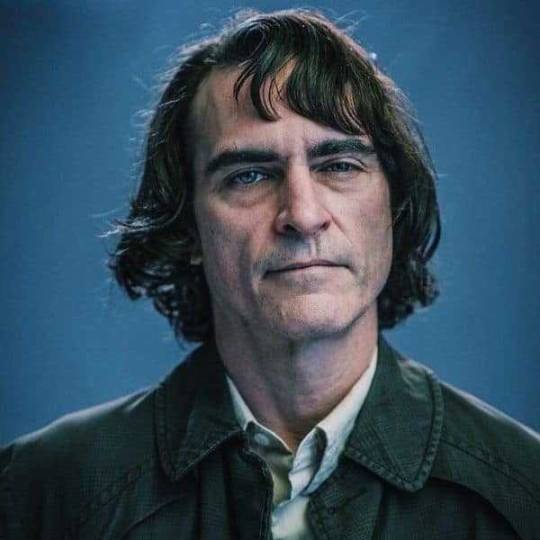
(the image in question)
As 2019 arrives, the two trailers generated so much hype that media needed to fuel its concern about it. Since it wasn't your typical comic book film, media basically bombed our minds making us believe this film was going to be a total disaster, an excuse to cause harm to others among other nonsense, as if the film would justify everything Arthur would do in the film, eventually. As the release date is closer, the film receives thunderous applause and unanimous praise from critics. At this, fans rejoiced and expressed impatience to watch the film.
October 5th.
People left the theaters amazed, shocked and genuinely moved by the inhuman treatment Arthur received in the film. The fear media tried so desperately to infuse in us with all the incel bullshit and such turned out to awake one of the most positive, best feelings in humans:
E M P A T H Y
The word that so gloriously cleared away any dark thoughts or actions not only proves media was wrong but it turned out to ridicule it in way nobody will forget: Hundreds of people advocating for mental illness, calling out to the kindness that could change a person's bad day and questioning how politicians and rich people are indifferent to social problems proved how much as a society we have changed in comparison with the one shown in the film.
However, since we are on Tumblr, I'll get straight to the point and try to explain why the fuck does this clown has us dying out of love and compassion (and lust).
I. Background.
As nurturing as we women are for a biological matter, we see a man deprived of a good job, is on seven different medications, working like a slave to sustain his ill mother, putting aside his own health and well-being to look for her, struggling to make his dream of being a comedian despite everyone stepping on him, underpaid and treated like a freak for a disorder he did not ask to suffer, which makes it impossible to be indifferent to all the horrible ordeal that eventually will reach the limit of what he can tolerate without going insane. It is impossible to not say or think, at least, that someone (even if it's just one person) should stand for him just as it is impossible not to feel the need to throw ourselves at him to shield him from people who hurt him or simply offer him our shoulder whenever he has had a bad day, specially when he learns he was sexually assaulted by his step father.
This horrid behaviour terrifies newer generations because they get a taste of what being a social outcast was like more than thirty years ago in comparison with today, where there's more acceptance and treatment for mentally ill people like Arthur. We see in him someone who could have been saved with a proper education and emotional support instead of descending into madness as a criminal. Others simply saw themselves being treated like him at some point in their lives and couldn't help but put themselves in his shoes.
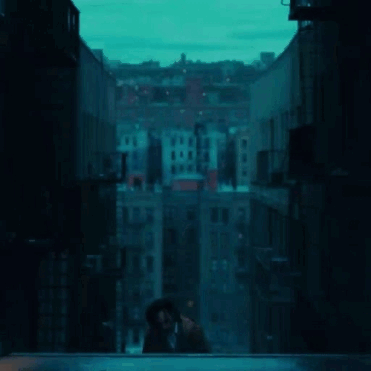
II. Personality.
TRUTH BE TOLD:
There's something called "attraction by proximity". It is the explanation to the eventual love you feel whenever someone doesn't catch your eye at first terms of physical attraction but his/her personality does attract you. This happens to be the base of this situation. His shyness, introverted nature, tenderness and innocent desire to make people laugh and put on a happy face awake some kind of tenderness we cannot resist. This combined with the gloomy background increases our understanding (but not justifying) of the bad decisions he'll eventually take during the course of the film. This traces a line of harsh, almost hurtful contrast of the violence he shows later on the film. Once again, it is not justified in any way but it is certainly understandable.
III. Appearance.
Arthur Fleck is unconventionally attractive.
This happens to be a plus for most women. He is out of the male beauty standards (no abs, not too muscly or particularly tall), which makes him even more unique. It is precisely the fact that he's not a model one of the reasons women love him. He could easily be your man next door or your colleague or the guy you always see but never dare to talk for fear to bother him Because it's about proximity. Arthur looks like your common neighbour. He's not meant to be your typical desirable male protagonist at all.
... And yet.
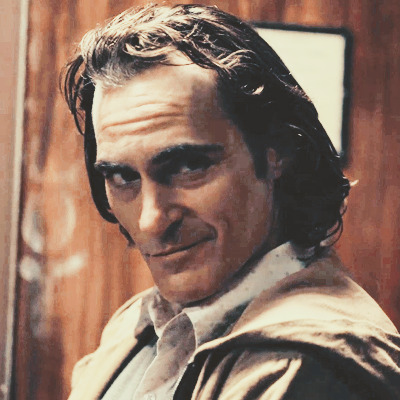
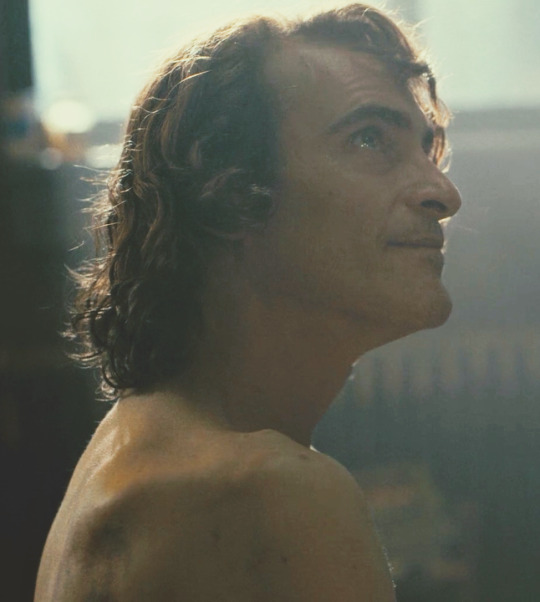
Jesus Christ, he's so fucking hot I can't even---
It's not about how beautiful his green eyes are, his long slender fingers, his hair or his smile only. It's the charm behind it.
Another "magnet point" is the way he dresses. I know he's impoverished and his wardrobe tend to be repetitive but it is so unpretentious, so simple that is hard to not fall for. The modesty of the shirts, ironed trousers reminds us of a mature man deeply withdrawn into himself, love starved and longing to be seen and loved by others, like a war veteran who still fights the most important war: with himself. Is someone who needs to be listened and understood.
AND OF COURSE WHAT'S NOT TO LIKE ABOUT IT?
He's also brought back the old gentleman outfit, white shirts, red/yellow vest, red suit and elegant dancing moves and the retro style of the film boosts this attractiveness.
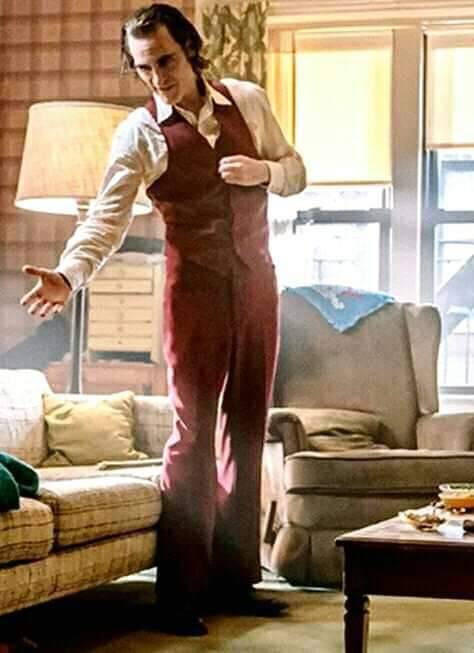
People keep comparing him with the previous interpretation of Joker (Leto's) whose costume appealed to young women with a tattooed, gangster, mumble rapper crazy-guy wannabe which didn't connect with the audiences (young people in general). This supposedly was to match or even have a sexy, tormented and desirable villain like Marvel's Loki. We all know how that story ended but it's the link for the next point below.
IV. Transformation
This is a particularly strong point considering how much we loved to watch the process of this weak, powerless, forgotten caterpillar into a beautiful and visible butterfly that will gracefully stir its wings for everyone to see its colours.
When Arthur transitions to the Joker, it's so cathartic to see taking revenge on those who wronged him (even when we're not supposed to root for him) like seeing his shyness fading away into a vivid confidence when dancing half naked in the bathroom, or witnessing him making way to make his name known to people in Murray Franklin's Show:
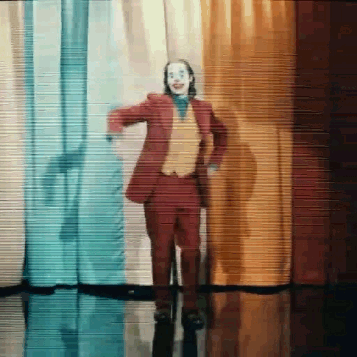
Adding to this newly gained confidence, there's another turn on: the way he walks.
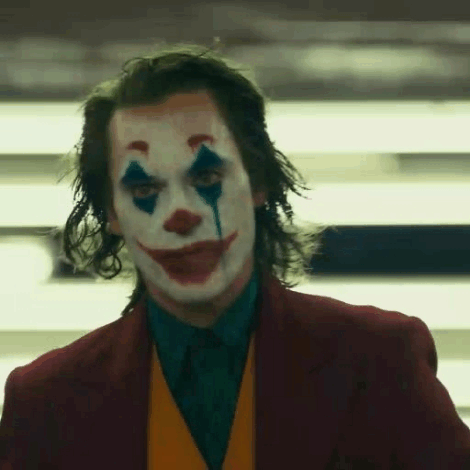
At the beginning, his pace is hunched and limping, displaying his submission to violence, which makes the viewer more satisfied to see his broken yet beautiful soul turning the past pain of his existence into art: he lets music guide his moves as a way to tell the world he's a new man by cutting most of the sick, evil roots that harmed him, that he's invincible, that no one can stop him. Watching this cathartic display of euphoria was the most iconic scene in the film, following his speech at the TV and the inevitable meltdown that caused Murray's death.
Going to further appreciation, even his clown make up is beautiful. Why? Simple. The combination of colours, shapes and the intimidating glare just embellishes even more the character.
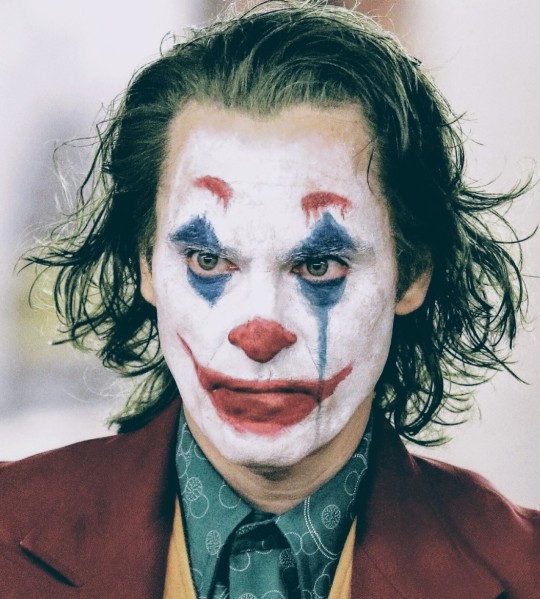
The dark blue triangles in his expressive eyes makes the light green colour to highlight, specially in dark backgrounds, giving the impression he's piercing your soul whenever he stares directly at the camera. Same can be said about the red smile and emerald green hair. They boost an already intimidating look.
The cold and warm colours paint a picture of a man full of intense emotions, mirroring it in a simple yet masterful artistic way.
Another interesting point is the way Joker dresses. Usually we had almost every single live adaption of this character in purple coat, hat, etc. But this particular version is not following any comic, which gives more freedom to creativity and once again, out of the standards of what we could have expected.
Red is a colour related to passion, action, love, strength, motivation and excitement. As for yellow, it indicates freshness, happiness and enlightenment and finally, green. Green is renewal, growth and regeneration. Colours that represent a new stage in his life, a mirthful chapter at last. We finally get to see our battered, always humiliated protagonist (or hero) descending into madness, but finally free from his repressed man who held his soul captive like a bird to fly away, to never come back. An insanity that despite being his downfall, turned out to be his ticket to freedom as he walks to the light in Arkham Asylum dancing at the end.
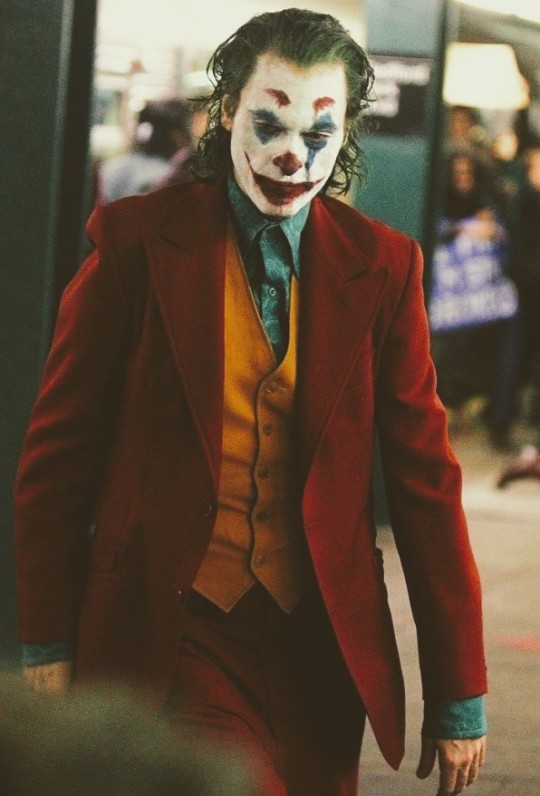
Ladies and gentlemen: behold the film nobody asked... But the film we fucking deserved.
Thank you for coming to my TED talk
❤️💚💛
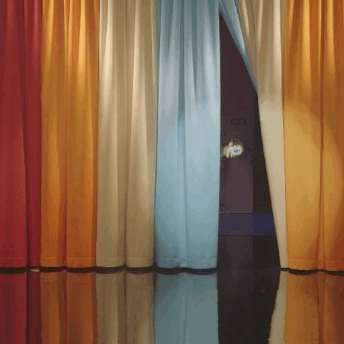
#joker movie#the joker#joker film#joker 2019#2019 joker#joker joaquin phoenix#joaquin phoenix#joaquin is so hot omg#dcedit#dc comics#he's so beautiful#arthur fleck imagine#arthur fleck#Arthur Fleck is I C O N I C#clown daddy#why do i like this clown so much?#i love this clown so much#hes baby#hes so pretty#omg hes so cute#protecc him plz#plz protecc#plz hug him#lol sorry#i had to#this movie gives me life#this man will be the death of me#i can't get enough of this dude#i can't get enough of this babe#arthur fleck x reader
426 notes
·
View notes
Text
Watchmen: My favorite show of 2019
Now that I’ve watched HBO’s Watchmen in its entirety, I can safely say that it is by far my favorite show I’ve seen this year. The more I think about it though, the less it seems to offer a coherent statement about vigilantism, power and violence the way the original graphic novel did. I don’t think this makes it any less clever, bold or satisfying to watch, but Watchmen is more interested in playing with the weight and drama of themes than actually expressing a clear, useful thesis about them.
The show is a sequel to the graphic novel, taking place in 2019, when the fallout from the 1987 story finally comes home to roost.
To give you some more context, I’ll be talking about Alan Moore’s 1986-1987 maxiseries of comics first, and then comparing it to the new television series narratively. In terms of acting and production values, I’d say that the show is great across the board, although your mileage may vary. This is doubly true of its narrative: I’m curious if the show is too confusing for people who’ve never read the comic, and the show doesn’t show a lot of reverence for the characters of the original. In my opinion, this is for the best and actually completely in the spirit of Alan Moore’s work. From here on out, There be Spoilers for the comic, movie and the tv series.
Watchmen (1987) by Alan Moore and Dave Gibbons is by far my absolute favorite superhero comic. It is the only graphic novel to be named as one of Time’s 100 best novels of the twentieth century. It’s certainly not true that it is the only graphic novel that deserves that kind of honor, but it is not on that list for bad reasons. This post would be too long if I listed all of Watchmen’s many achievements, so I will just say this: Watchmen investigates how the existence of masked vigilantes and superheroes would change the real world, and its answer is not positive. No matter how you slice it, in order to inflict violence on strangers or save the world based purely on your own moral compass, you have to be either hopelessly naive or narcissistic, sadistic, fascistic, fetishist, manic, or untethered from human experience in one way or the other. However you imagine them, superheroes escalate danger. They are not cooperative or peace-loving by their nature, the comic says. ‘Superheroes’ will do terrible things in the name of ‘saving the world’ or ‘doing the right thing’. In this sense, the book is thoroughly anti-utopian but also anti-superhero, and it commits to this by depicting all of its ‘protagonists’ as deeply flawed, ultimately dangerous or inept people.
In terms of plot, the big twist that effects the show is that the smartest man in the world, the vigilante Ozymandias, predicts that nuclear armageddon is inevitable unless he convinces the global superpowers that there is a massive alien threat, making their feuds appear petty and risky by comparison. He literally kills millions of people with a genetically engineered giant monster that he teleports to New York, not including the dozens of murders to prepare the ground and cover up this fact. The fear that more monsters like this could appear prevents nuclear war at the last second, but another vigilante named Rorshach figured out Ozymandias’ plan and wanted to expose it, which would undo its intended peacemaking effect. He was killed, but his notes survived.
In the end, the only vigilante with actual superpowers, Dr. Manhattan, is so far removed from human experience because of his godlike powers and his nonlinear perception of time, that he seems to retreat from Earth itself, expressing a desire to create life elsewhere.
This is the backdrop against which Watchmen (2019) frames itself: what would that alternate history look like about 20 years later? But instead of focusing on the evils that vigilantism and superpowers would create, this sequel puts race and policing at the core of its narrative. The main protagonists: Angela Abar, Will Reeves, Laurie Blake and Wade Tillman are all cops and all of them are at one point in their lives masked vigilantes. They are also pitted against white supremacist terrorists, and the show depicts them as regularly violating the constitutional rights of suspects and killing lots of people in justifiable situations. The show depicts both cops and civilians in both real and historical race riots.
But the more I think about it, the less I can identify a coherent thesis about the origins or nature of racism or the morality of extra-judicial violence. It seems to say ‘violating a person’s human rights is alright as long as they’re racist’, and I mean, I can’t be too mad about that, but it also implies that the cops are basically good, that it is possible to root out specific racist conspiracies and that’s all that’s needed to set things right. There’s a definite assumption that most of the time, we can just trust cops to have integrity. The show rarely frames unmitigated violence as a systemic issue; even when the government is implicated. The protagonists are also relatable and sympathetic, and their victory against the white supremacist conspiracy is without any real moral complications or ironic personal costs. This show, unlike its source material, is pro-vigilante. Or at most neutral on the subject.
Its message about racism is more straightforward, but also a little hollow. Racist violence is shown viscerally, but also roundly condemed, ridiculed, and avenged by the protagonists. But that’s really as deep as it goes. All racists in this show are openly and stereotypically Southern whites. There is very little exploration or covert or insidious racism: there is a clear divide between literal neo-KKK types and antiracist avengers, with little ambiguity in between. We are not really shown what drives racists to be racist. The most motivation racists are given is a resentment over two attempts at improving the world: Reparations for the Tulsa Massacre, and the aforementioned plot to stop the Cold War by faking extradimensional invasion. Not that I’m begging for a humane portrayal of racist terrorists, but it does make it extremely easy for actual, less obvious white supremacists to ignore any criticism because ‘at least they’re not like the Seventh Kavalery’. It in short, doesn’t give viewers any special insight into racism and how to deal with it in the real world.
What Watchmen does do beautifully is representation. The first masked vigilante, Hooded Justice, who in the comic was a clear reference to a Klansman, is reimagined as the victim of a threatened lynching, who fights his attackers still wearing the noose and hood they put on him. He then pretends to be white to gain the support and cover he needs to be a vigilante. This man, Will Reeves, named himself after his childhood hero, the historical inspiration for the Lone Ranger, Bass Reeves. As a child, he was smuggled out from the Bombing of Tulsa in the trunk of a carriage, much like Moses or Superman. We later discover that HJ is bisexual and is essentially strung along for years by the media-savvy Captain Metropolis for publicity purposes and sex, and ends up desillusioned by his white allies. We also learn that Angela Abar, the de facto main character, is in fact his granddaughter, and she becomes involved in his decades-spanning plans to root out the racist conspiracy that the plot revolves around.
Perhaps even more interesting is the decision to integrate Doctor Manhattan into this sequel as a jewish and a black man. Rather than simply recasting the part, the show frames the revelation in a way that Dr. Manhattan might experience it: out of order, but also clearly telegraphed. The show uses this to characterize Dr. Manhattan as someone whose decisions do not adhere to standard causality. Why does he start to woo Angela Abar in the first place? Because from his perspective, he’s always been in love with her. Just like nothing ever ends, it doesn’t really begin from his perspective either. One day, he walks into A Bar and starts explaining to Angela Abar that they will be in a relationship for ten years, which wil then end in tragedy. While she is understandably skeptical, Regina King and Yahya Abdul-Mateen II really manage to sell both the frustrating absurdity and the transcendant romance of this idea. In the end, Osterman chooses to take the shape of a dead man based purely on the fact that Angela is most attracted to, and goes to great lengths to lose is powers and become human again, as a black man named Calvin Abar, who we first meet as Angela’s charming stay-at-home husband and father to their adopted children. The fact that he is Dr. Manhattan all along is revealed to us in my favorite sequence in the whole show. We, the audience, fall in love with both the husband as well as the God, Jon Osterman, as both are vulnerable and honest about who they are. Even though everyone knows it can’t last. These scenes are both heartbreaking and beautiful, and are foreshadowed masterfully from the beginning. This is what I mean when I say the show is clever.
The dialogue is witty and the cinematography, editing and plotting do a subtle job of worldbuilding. There are very few exposition dumps and characters rarely do or say things just to help the plot along; they are always driven by their own motivations rather than those the viewer might prefer in their hurry to learn more.
As a result, characters feel smart and their personalities and relationships develop more naturally. From Jeremy Irons’ Ozymandias to Hong Chau’s Lady Trieu to Jean Smart’s Laurie Blake, they all come across as clearly defined assholes with a charismatic competence.
The world and its history also unfold at their own pace. This can be confusing in the first couple of episodes. It isn’t explained why cops wear masks, what ‘Redfordations’ are, or why squids rain from the sky often enough that a siren goes off whenever it happens. Instead, viewers piece a lot of it together from context. The details make it feel very believable. It makes me feel like I’m discovering an alternate history the way a lost time traveler might.
In the end, it is not the themes that make this version of Watchmen so enjoyable. Its the intricate details of its world and the interactions between its characters that make Watchmen 2019 so fun to watch. And as far as on the nose messages go, ‘vaporize as many racists as possible‘ isn’t that bad.
#Watchmen 2019#Watchmen HBO#reviews#fave shows#fave show of 2019#Dr. Manhattan#Angela Abar#Hooded Justice#Cal Abar
8 notes
·
View notes
Text
These are some of the questions I really, really want to see people ask the Russos at SDCC 2019 in some capacity:
In a Q&A session on Reddit, you guys said that by going back in time and marrying Peggy, Steve would have started an alternate reality, and thus grew old in a parallel universe. However, in an interview with Fandango, Markus and McFeely said that Steve remained in the current timeline when he married Peggy because you need to remove an Infinity Stone in order to start a branched reality. So, which one is the correct interpretation? Why weren't you and the writers of your own movie on the same page about this? (I'm dying for someone to ask this because the Russos will either have to admit that they're idiots who didn't understand their own movie or they'll have to throw M&M under the bus.)
One of the themes or overall messages of this movie seems to be that we don't get the opportunity to completely undo everything bad that happened to us and pretend like it never happened in the first place. The concept of time travel on this movie is specifically designed such that the Avengers cannot just go back and make the Snap never have happened in the first place: they can bring everyone back, but they still need to deal with that five year loss, and those who are un-Snapped need to deal with the world moving on without them for five years. The scene in 2013 Asgard is another reminder of this: while Thor wants to save his mom, and make it such that she was never killed, Frigga and Thor remind him that he needs to learn to deal with this loss, and focus on the people who need him in the present. The big exception to this theme of having to deal with consequences is Steve's ending. He is portrayed as perfectly justified in essentially hitting the reset button on his life: he gets to go back and change things to get everything he apparently ever wanted, so ultimately he doesn't have to "move on" or "cope" with anything. And all of Peggy's attempts to move on from him are moot too. How do you explain this seeming thematic dissonance between this ending and the overall message of the movie?
Why did you not include an on-screen reunion between Steve and Buck? They have one of the strongest and oldest bonds of any two characters in the MCU, and Markus and McFeely went so far as to call them platonic soulmates in the introduction to the Captain America: White comic. Yet while we got battlefield reunions for everyone from Tony and Peter to Scott and Hope to Groot and Rocket to even an exchange between Carol and Peter, the only scene we get between Steve and Bucky is a goodbye scene.
You have started that you believe that Steve's character arc involved him going from a state of selflessness to selfishness. But isn't it a little too selfish for him to essentially reroute Peggy's life based on his desires alone? He knows that Peggy eventually moved on from him after he crashed the Valkyrie, fell in love with someone, and lived a fulfilled and happy life with this person. Even if Steve had actually been her husband all along, there's no way he knew this. So when he goes back and marries Peggy, to his understanding he is preventing her from ever meeting her husband and erasing her family from existence. He has never been given any indication by Peggy when he talks with her older self in Winter Soldier that she ever truly regretting not marrying him, or not getting to start a family with him: she obviously loves the family she already had. So what makes Steve believe that he had the right to do what he did?
In Endgame, Steve is shown to look at his compass with Peggy's picture in it during times of distress or despair. You have directed three movies prior to this featuring Steve Rogers, but he never seemed to do this in any of those movies, and we haven't seen the compass on-screen since the museum scene in Winter Soldier. Why has the compass suddenly reappeared now?
Your interpretation of Steve's relationship with Peggy has seemed to vary drastically over the course of your career at Marvel. In both Winter Soldier and Civil War, you acknowledged Peggy's importance to Steve, but you blatantly tried to set up a romantic relationship between Steve and Peggy's niece Sharon, and when asked whether this relationship was weird given Steve's history with Peggy you said that Peggy was "just someone he kissed once in a moving car with Tommy Lee Jones in it." Yet now, you refer to Peggy as the "love of Steve's life" and "Steve's greatest loss." What was the impetus for this radical shift?
Why didn't Natasha get a joint funeral with Tony? Like Tony, she sacrificed her life for the mission, yet while the Avengers were visibly upset at the news of her death, by the end of the movie not only did she not get a funeral but the only person to ever mention her again was Clint.
Why did Steve mention Peggy at the group meeting, instead of Sam, Bucky, or Wanda? The meeting is specifically for people who lost loved ones to the Snap, yet he brings up the death of a woman who died of natural causes in her nineties two years before the Snap, instead of the deaths of his friends who were actually Snapped.
Why did Thor never mention Loki? He was visibly distraught over the loss of his brother in IW, yet not only does he make no mention of his brother or of missing his brother in Endgame, but when he passes by Loki's cell in 2013 Asgard he doesn't even pause to look at him.
Why was there no resolution to the conflict between Tony and Bucky? There is clearly a large amount of resentment on Tony's part by the end of CW against Bucky for the latter's role in Howard and Maria's deaths, and there is no indication that they ever made peace with each other off-screen before Endgame. Also, Tony blames the Avengers' loss to Thanos on them having been split up, and Bucky was a main contributor to this. Yet, at no point in the movie does Tony even mention Bucky, nor does Steve.
Prior to the release of the movie, you advertised Endgame as containing the "first openly gay character in the MCU." This character ended up being an unnamed extra played by you, Mr. Joe Russo. Why did you decide on this course of action for LGBT representation in the film when, for example, there was already a comic-canonically bisexual character in Valkyrie?
Why couldn't the Avengers just go back and steal the still-functioning gauntlet containing all the Infinity Stones from Thanos right before he destroyed them? They know where he was and when he destroyed them.
Please feel free to add more! To those of you attending the panel: we're counting on you to call the Russos out on their bullshit!
As I said in a previous post, try to be as eloquent and polite as possible, but go for the head. Use their own past statements and movies against them whenever possible. Stack up your evidence (of which there is plenty) and don't leave them room to side-step the question.
(Yes, I will be bitter 'til the very end.)
45 notes
·
View notes
Text
(Un)Natural Selection Chapter 4
Éponine
Over the next few weeks, I made sure that I was paying extra attention to how Azelma was being treated by my parents. I had always been treated differently because of my purpose, but of course, they had beaten me when I was younger. The scars were old but present in sporadic places. A few on my back, one on my stomach, and that ran across the palms of my hands. But after Azelma had been born it was like they had made their own personal punching bag. It stopped for a while after Gavroche was born, but when he ran away a few years ago my parents took a turn for the worst. Azelma would be in so much pain she couldn’t even get out of bed some days. During those days Madame Brouder always sent me home with some extra food. I’m not sure how she knew something was going on, because we never talked about anything related to my family.
On the day of announcements, the Brouder’s sent me home early with a loaf of bread and some cheese, just in case the outcome was less than desirable. I immediately hid the food under a loose panel beneath the sofa. My mother quickly emerged in what appeared to have been a new, or rarely worn, dress.
“Why are you still in those dirty old things?” She asked as if she owned many clothes better than mine.
“I just got back from work.”
“Oh did you?” She held out her hand. I took my wages out of the pocket and gave them to her. How could I have thought she would forget, even with The Selection being announced in less than an hour.
“Good. Now go change into something presentable,” she waved me away.
I wanted to turn around and tell her that there was a one and million chance that I would ever become a princess. I wanted to tell her that even though I had spent my entire life watching the prince, all I had learned was that he appeared cold and distant. I wanted to take Azelma and run away to the Brouder’s house where we would be raised with love and compassion. However, on the slim chance that I did get selected, I didn’t want Prince Julien to meet me with a black eye.
I decided to put on the blouse that I wore on the day I turned in my application. There wasn’t much point in dressing up unless the entire apartment complex wanted to break curfew in order to congratulate me for not getting selected. After I turned in my application I started to notice things about other girls that I hadn’t noticed before. I noticed how the girl that worked at the grocery store always had a smile on her face, which made her more attractive. I noticed how the girl that lived next to the Brouders always sang in a smooth, beautiful voice when she came home from school. I noticed how dark the circles under my eyes were and how all I was just skin and bones. According to my mother, who was unusually heavy set for our caste, men really only cared about your physical assets.
When I emerged from the bathroom I found that my parents had settled onto the couch and turned on the preview of the Report. Azlema was in the kitchen portioning out rice and chicken for dinner.
“Oh, there he is! Our future son-in-law!” I wondered how ridiculous my mother sounded to the neighbors, since everyone with a daughter would be thinking the same thing.
I turned towards the small television to observe the prince. As long as I could remember, he always had a head of loose golden curls. There was a difference between his and Azelma’s hair. Azelma’s hair, no matter how blonde, had always appeared dull, while the prince’s hair seemed to radiate. His demeanor had been the same since he had started addressing the country: passionate, serious, and made of stone. The Report had never shown the prince to show any sort of emotion. The Queen was known for her compassion and empathy when she addressed the Nation, but maybe that was because she was a woman. Queen Caroline always had kind eyes and a gentle voice that partnered with her desire to provide education to children of all castes. Did I have compassion in my eyes, or did I appear as cold as the prince?
“Azelma you brat bring us our damn food!” my father demanded, flicking cigarette ash onto the floor.
“Here you go, don’t choke on the chicken bone,” ‘Zelma walked two plates over to the couch. I pulled a wooden chair up next to the couch and motioned for Azlema to sit at my feet. I began to play with her hair as I watched Kyran Cervantes, the royal announcer, interview Queen Caroline.
“Your Majesty, can you believe it has been twenty beutiful years since your time in the Selection?” Kyran asked, smiling with his pearly white teeth.
“Don’t remind me, Kyran,” the queen laughed,”it feels like just yesterday I was a bundle of nerves dressed up in a fancy gown.”
“I never would have been able to guess! In fact, if I remember correctly, the public loved you for your graceful and calm demeanor.”
“Oh course they did! I was always calmest when Orson was with me, and I still am,” she smiled and looked over to the King who was beaming at her.
“The citizens of Illeá are completely indebted to the last Selection which brought together our wonderful King and Queen. And now it is time to continue the noble Enjolras line! We have hundreds of thousands of young ladies anxiously awaiting to find out if they will have a chance to win over our beloved Crown Prince Julien,” the camera panned to the prince, who had an unusual gleam in his eye.
“Your Majesty, do you have any advice for the Selected?” The Queen didn’t even hesitate with her answer.
“Ladies. You will laugh, you will cry and there will be days when you will question why you ever even applied. So my advice is this: just have fun. You will never do anything like this again so enjoy it! Just be yourself and let your light shine,” there were those compassionate eyes.
“What inspiration words of wisdom Queen Carolina. We are all honored to be your subjects, but not as honored as Prince Julien is to be your son,” Kyran said, walking over to the Prince’s seat.
“Speaking of Prince Julien, how are you fairing on this momentous night?”
What happened next truly shocked me. The all serious, marble man that I had grown up observing, chuckled.
“I’ve never seen him even smile,” Azelma said, looking up towards me.
“Maybe he just had some wine before going on the air,” I suggested as she turned back around to the television.
“I’m excited for this great opportunity I have ahead of me. I think I’m even more excited for the wonderful young ladies whose lives will be changed tonight.”
“Speaking of those wonderful young ladies, do you already know who they are?” Kyran comically leaned in, as to hide the prince’s response from the King and Queen.
“Funny enough, all the files of the selected girls are on my desk, however I’ve been so busy today that I haven’t had a single moment to look them over. In fact, I want this year’s selection to be a bit different,” the camera panned to the King and Queen, eyeing each other.
“For this selection, I have no desire to know what caste each Selected girl is from. I want to ensure that all of Illeá knows that my intentions are pure. And for that reason,” he said standing, “I must bid everyone a goodnight and congratulations to all of the lucky Selected! I might not want to know the castes, but I know many of you do.”
With that, he shook Kryan’s hand, kissed his mother on the cheek, and left the studio.
“What an incredible statement by our future King! And with that, let us reveal the thirty-five young ladies chosen for the Selection. Ladies and gentlemen, please join me in congratulating the following Daughters of Illéa!”
The screen changed so that one side of the screen the King and Queen’s reactions were being shown and on the other, a place for the pictures of the Selected.
“Miss Iris Hathor of Waverly, Four.” A photo of a tan, freckled girl, maybe a year or two older then me appeared. I wondered how she got all those freckles being a three.
“Miss Teresa Gilbert of Hansport, Two.” My jaw dropped at the sight of the famous child actress that had starred in almost every movie made in the last ten years. The King nodded his head in approval.
“Miss Cosette Fauchelevant of Kent, Three.” A porcelain face with bright blue eyes and golden blonde hair appeared. My mother spit up her drink.
“Ain’t that the brat we took in from that whore?” She exclaimed, turning to my father.
“I’ll be damned, I bet that man paid his way up to the Selection too.” Just as I was turning to ask them about why that girl looked so familiar, I caught a sight I never truly thought I would see.
“Miss Éponine Jondrette of Allens, Six.”
My heart stopped beating. Azelma screamed, and wrapped herself around me. My parents embraced each other, proud that their ultimate con was finally going to be possible. People in our apartment complex that had never spoken to us ran over to congratulate me. But all I could do was sit, watching the King and Queen stare at my picture in shock. And I knew that I had no chance of winning the Selection.
#enjonine#prince enjolras#eponine thenardier#enjolras#les amis#les miserables#fanfiction#cross-posted#ao3#cosette#marius#joly#grantaire#gavroche#modern universe#musichetta#the selection#cossover
1 note
·
View note
Note
I think i fell into the trap of villains being more interesting than the heroes in bnha. I find tomura more entertaining. The kids in 1-a aside from bakugou and maybe todoroki are too nice? What are they’re flaws?
Hiya! Thanks for this cool question! I’m sorry, but you’ll be getting a looong essay from me!
And yeah, same!! Though I don’t think its that the UA kids are boing/too nice/flawed. When I first started watching MHA, I was on the lookout for a favorite character to stan. Uraraka, Iida, Eraserhead, even Snipe(???)… I actually didn’t care for Shigaraki Tomura at first, tho I did like his creepy vibe. When I finally did take notice, it was a delight trying to figure him out because he’s so contradictory and still mysterious. Making sense of it all/using all of the pieces to discover a characterization that made sense, was just fun and rewarding.
IDK exactly what changed to make me like him, but I think it was that I got interested in the worldbuilding, how exactly quirks and heroes and villains exist. Villains are a really cool perspective to look at the society from, and who better to use as an example than hand man?
…Which is also the main flaw I perceive about MHA.
(Everything here is my opinion! I’m a huge sci-fi/fantasy fan so that’s the angle I’m most interested in, and also I read the non-villain arcs like once and that information has largely been crowded out by the ever-expanding and all-consuming thoughts of the League of Villains, so I will get somethings wrong)
IMO, Worldbuilding is a bit weird, in that it’s not enough to establish the norms - which is hard enough - but often you must also establish the taboos. Figuring out how things function includes examining the dysfunctions. Sometimes you create a world only to tear it down.
But that’s the heart of speculative fiction - imagining different ways of living, different ways the world could be, taking aspects from our world and dissecting it. “Fantasy — the fantastic, the imagination that I love so dearly and that I’ve used to try to construct my own work — is everything that helps to expose more clearly and more powerfully the reality that surrounds us,” Julio Cortazár said. The classic sci-fi stories of exploration and invasion, othering, transhumanism - all are already issues irl: colonialism, discrimination, disability. The lives and conflicts in those stories can exist because of the lives and conflicts of real people as sources to build upon.
@dabistits has said this much more eloquently and comprehensively than I ever could, so go read her meta!!
It’s obvious Horikoshi has put a lot of thought into figuring out his world, with all sorts of details to flesh it out - he writes into it issues like the accommodation of bodies that deviate from the supposed norm; what if people had innate differences, some of which are seen as dangerous; discrimination; self-determination and the right to bear arms affecting the social contract. You can say, ‘Nal, you’re looking too deep into this, it’s a comic for 8-year-olds’, and it’s true! But the first words the begin the story are ‘People are not born equal’; I’m taking it as invitation to examine that.
So we have a world with its many dysfunctions and flawed systems. Everything that happens hinges pretty much on quirks. I think a great way to explore that is using plot and characterization. It’s not characters being plopped into the world; the world produces the characters. Development occurs as a response to trying to live under these conditions, trying to grow and push the boundaries, or accept and pass it on.
But I feel like Horikoshi haven’t done this with the UA kids?
These students are in the contained environment of school and not really interacting with the people they are to protect and serve, and their goal is to get stronger and more powerful but that’s kinda indistinguishable from any other shonen manga and not Hero-specific. Instead of just ‘use my quirk to punch a bad guy and save the day’, I wanna see situations where the kids learn that they cannot use physical methods, I wanna see the moral dilemma of arresting a person who punched out someone discriminating against them, I wanna see them having to accept failure and death as part of the job, dealing with the compassion fatigue. The Hero-specific things. Also, we don’t get to enter the headspace and background of the rest of Class 1A. It’s not the kid’s flaws.
So the questions Horikoshi brings up about society isn’t actually usually answered by the heroes (some of the exceptions are, as you point out, anon, Todoroki and Bakugou). They’re answered and navigated by the Villains. The Villains are the ‘failed’ products of the world, their grief and discontent is due to being unable to function in this specific society. Their motivations are specific to Hero-society and quirks. And I love that! I love that we get a better sense of the setting and society through their stories - Twice is the one who gets to show us the effect of All Might’s retirement, Spinner introduced us to mutant discrimination, Detnerat gave us some important info about the economy and quirk-usage rights.
The Heroes don’t get that? Not really? At the beginning of the manga, we do, though! Todoroki and his family, Shinsou and his quirk, Tenya and his brother. But after that, iirc, an issue is brought up, then usually quickly resolved. Kouta hates heroes? Midoriya becomes his hero and Kouta has a change of heart. The media rightfully rips into UA for the camp fiasco and the public agrees? The AFO and All Might fight overshadows that. Aoyama and Midoriya share a moment over quirk-incompatibility, but nothing more than that.
It’s not that I just side with the Villains completely. I love Vigilantes, and I love the characters that try to do good. Vigilantes explores the dysfunctions and idiosyncrasies. Doing good despite breaking the rules; the desire to use your quirk but having to suppress this innate part of yourself; questioning the Hero system but keeping the ideals.
Koichi, the main character, is very sweet, ‘too nice’ as you might describe, very mild-mannered, his adventures limited mostly to the streets of his neighborhood. He is not flashy like Shigaraki, but I like him a lot. His growth is in response to him learning to be a citizen of his world - what it means to do good, having to interact with the community and its people, finding a niche to make use of his quirk. Making a lasting effect on the every day of the streets. The ‘trigger drug’ storyline works really well because it’s both giving us some insights about how official investigation works and the legal definition of ‘Villain’ (Tsukauchi), the use of social media and Pop’s influence to detect the villains, the biological mechanism of quirks and things people use to enhance it, along with Knuckleduster’s history and developing the relationship between the vigilante trio.
So yeah! I feel like the full potential of the story Horikoshi wants to tell - this world that’s still dealing with the consequences of quirks appearing, the law enforcement system that arose from having to govern millions of individual with a million different abilities and needs, all of who has to learn how ‘great power comes with great responsibilities’ applies to them, and villain created by these circumstances, who is fated to be in a century-old battle that came to be because of the advent of the extraordinary, a wild fantastical full circle - hasn’t been shown through the UA kids and heroes. Instead, it comes across better from the Villains, and that’s why imo I find them more interesting.
#so sorry for the late reply!#thank you for asking!#this was a really fun one to think about#nalslastworkingbraincell#Anonymous#got kinda messy tho towards the end sorry!!#worldbuilding#kohei horikoshi#mha#bnha#heroaca#Villains#writing
56 notes
·
View notes
Text
Costume designs and the role of the Skirt in the Modern Female Hero.
With recent discussions over costumes in regard to not only She-ra but in the past few years in regard to Wonder Woman and several other prominent female heroes, I wanted to step back and take a look at why a skirt, in a lot of cases, is actually a better option for a fight then say a very tight leather outfit.
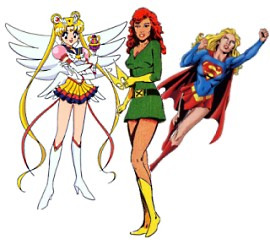
I had this discussion with my male friend who had just started to read Wonder Woman with the New 52 and he asked why it was that people were upset over the redesign with the pants. My answer at the time was, they look like jeans, you can’t really fight well in jeans designed like that. They will rip and tear, and she is a warrior and shouldn’t have to be restricted by what’s on her legs for moving. A skirt or shorts would work better for her.
He at the time replied that she should wear pants. We went back and forth for a while until I brought up the fact that having a lady wear a skirt isn’t meaning she’s a weaker fighter, skirts are actually less restrictive for movement and one of the reasons why the Romans and the Greeks wore them into battle, along with the Scots who wore kilts. The idea of the skirt as a worn by a warrior predates a lot of modern conceptions as women and men wore the style when fighting. Lets we forget that part of the idea of armor during the time of the knights was because of the newer weapons that had supplanted the bronze age swords of the period with harder steel weapons, so they needed more to protect them than the light armor and leather that they were wearing.
However this idea of the skirt still stuck around regarding fashion for women, because, well, people like legs (although for a long period showing any legs off was a bad idea). Women, and men, in the entertainment world tended at the time to stick to shorts and it was shown in how Strong men were used for the Superhero look (see DC and Marvel with the outside underwear) while ladies like Wonder Woman were given more of a swimsuit/athletic look. Now the change to this started around the time of the whole issue with the Comic book Panic that came about because of the book Seduction of the innocent came out and freaked people out about various things in comics. Women at this time were wearing skirts, though they were limited.
This changed by the 1950s to Female heroes wearing skirts to show their feminine side. The idea had always been there that women could wear make up and look “dolled up” in comics way back in the days of Wonder Woman, because she wore make up all the damn time in the stories. Also a number of the female heroes were Girls, and seen as well teens and children. The reason being that girls in the period wore skirts. It was pretty much ordered by the schools that girls had to wear skirts at the time. It was the 50s. Into the 1960s things changed and you saw skirts replaced with pants, shorts and in some cases the start of the bathing suit look. The trend continued into the 1970s, and some what in the 1980s where the suits changed some, but were mostly one piece swim wear for the most part for costumes of some characters. It really wasn’t until the 1990s that you saw this “Overly sexy” look come about and I can point to the shift being by the late 1980s you had a lot of cheese cake showing up in movies, so to drive sales of comics (which the industry screwed up on it’s own) a lot of artist started to turn to making women look more desirable and wearing less. You can kind of thank Image Comics for a lot of that as well.
So why talk about any of that? Well to give an idea of where the skirts came from. Most heroes that wear skirts were invented in the 1950s and the look was popular among the female population. So of course you would have the characters in books wearing skirts. This never though replaced the fact that they were strong and independent characters that had their own villains to fight and later on allowed for newer female characters to come in and stand out as leads.
By the way for those that think that a strong character can’t wear a skirt and still kick butt, well here are a few characters that do wear skirts and are seen as iconic, independent and strong females that have inspired both men and women in all walks of life.
Starting with Super Girl.

Kara Kent, or Kara Zor-el is as strong as her cousin Clark and can pretty much take on anyone he can. She has the same set of powers that he does, and one version of her later became Power Girl who, depending on the writer, can in some cases lift twice as much as he can. She also almost single handed beat the Anti-moniter.
Marvel Girl -aka Jean Gray

Early costumes for Jean was this green piece after graduation. Her reason for it came down to her wanting to look different than the other members of her team and fashionable as well. She is, bar Xavier, arguably the strongest mutant on the planet with her mental capabilities, and has been shown to have so much power that the Phoenix force stayed with her for many many years after the first Saga finished.
Mary Marvel

Mary is the sister of Billy Baston, aka Captain Marvel aka Shazam. Like her brother when she calls down on the power of Shazam she can become Mary Marvel, who is just as strong and powerful as her brother, and blessed by the gods. This girl can do what her brother can, and, on top of all of that, has proven to be able to go toe to toe with Super Girl and Power Girl in recent years. She is a force to be reckoned with. (And Ignore the Black Mary Marvel stuff that Johns wrote for Countdown it made no sense.)
Flamebird aka Bette Kane
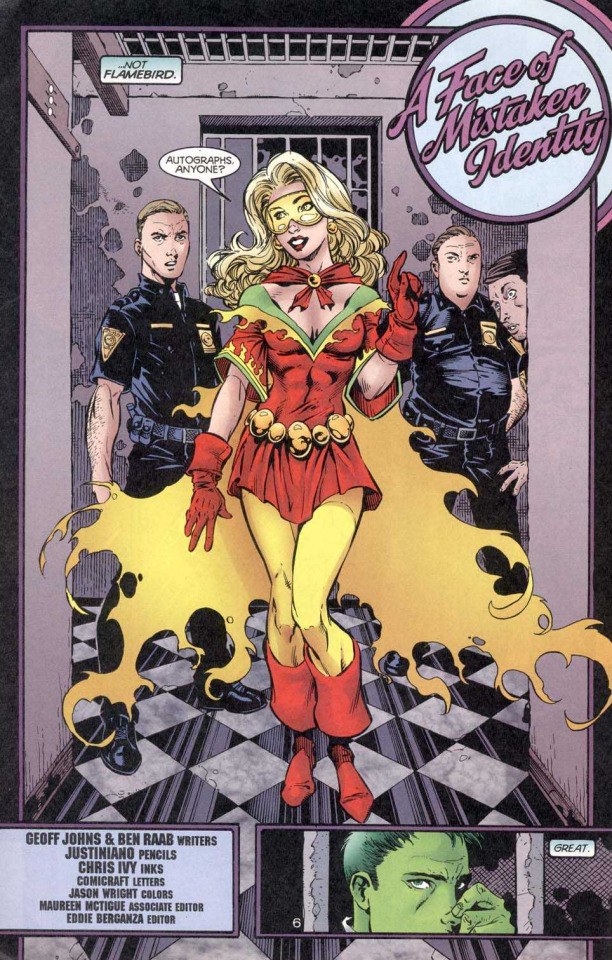
The niece of Kate Kane, Elizabeth “Bette” Kane started her career as a wanna be side kick and a fan of Robin. She grew to be as good a fighter as her aunt, and pre -52, she ended up becoming a teacher who was a strong detective in her own right. Her Aunt has taught her various forms of martial arts and the two train together as Bette intended to become a person that could protect others the way that she saw Robin (Dick Grayson) protect people during his tenure.
Bomshell version of Batwoman
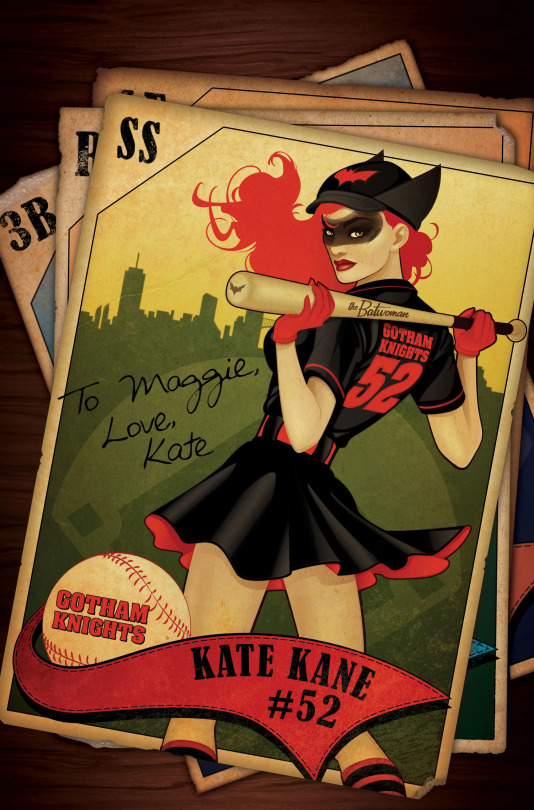
Basically Kate Kane as a baseball player and wears the outfit that her team wears when she fights. It’s pretty much all the awesomeness of Kate Kane but just wearing a female baseball uniform worn in the 1940s.
Ms. Marvel aka Kamala Khan

While technically considered a tunic, the top part of Ms. Marvel’s outfit is considered a dress and can be worn as such. Kamala added the tights and other aspects because of her preference for dressing. However, yes that is a dress she has on. Also let’s not forget how powerful she is and how cool she can be even when geeking out. See her meeting with Wolverine for the first time.
The Sailor Senshi

When Naoko Takeuchi first created this group of girls she had one thing on her mind. Sentai. You know, Power Rangers. But she wanted to use fashion as it is one of her passions. So she created these strong girls who grow as the series goes on, but every one of them wears an outfit that is recognizable to the female population in Japan, that of the school girl uniform. Yes the skirts are short, but that allows for their movement and is part of the Sentai look of uniformity with color co-ordination. Also did I mention that Sailor Moon literally saved Earth and everyone from a darkness by the power of her love for it, and killed parts of Chaos, an entity that has existed since the dawn of time. Yeah, girls in school skirts can crush monsters.
Jun from Gachaman

Jun, or princess if you go by BoTP, is one of the strongest fighters of the Gachaman team. Her skills as a master of Kagaku Ninpo allow her to use her aglity to create powerful kicks and hits on her enemies. She also uses a Yo-yo as a whip and flail and it’s electric.
Wonder Woman aka Princess Diana, Diana Prince

Do I even need to talk about her? I think not.
Xena Warrior Princess

Played by Lucy Lawless until the early 2000s, Xena was a huge character, powerful and full of compassion. After being a battle hardened character who at one point was an enemy of Hercules, she later went on to spin off on her own show and became not only a mother, but also was seen as a gay icon for many women and men.
The Female lead in Assassin’s Creed Odyssey.

A Spartan by birth, our canonical lead here, as said by the development team and the books, sports the same fashion as her non cannon male counter part.
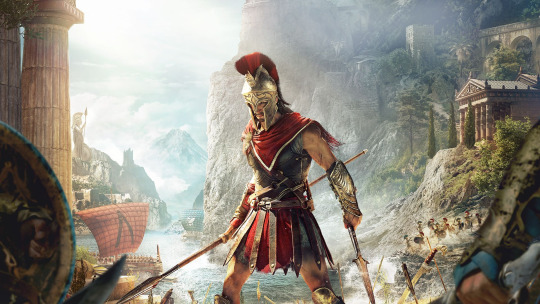
Both run around in a skirt and are warriors trained by birth to do battle with the forces that are causing issues for their people.
Chun li Street fighter
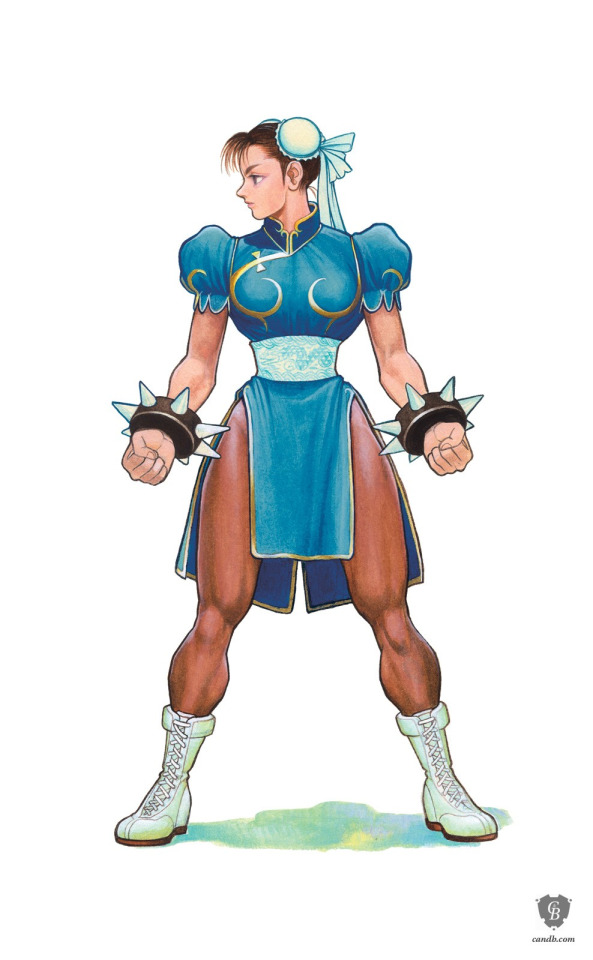
One of the oldest Video game heroines. Chun Li is an interpol agent and has many awards under her belt. A known master of various martial arts, she also is a sharp shooter. Her outfit is that of a Chinese qipao, a type of dress made popular in the 1920s, which she wears in honor of her late mother, and which she modified for movement.
So with that in mind I would like to Add She-Ra to this list of Bad -ass females that wear skirts when fighting.
She-Ra aka Princess Adora

With a strong sense of morality, the same strength as her brother when he’s in He-man form, and the skills with a sword and a gun, (and a strong jaw line to boot) She-Ra fights in a war that has nothing to do with her directly and left home to help her friends in the Rebellion. Her transformation is much like that of Mary Marvel, in that she calls down the power from Gray Skull and becomes a more powerful version of herself capable of fighting off Hordak and his evil Horde.
So, with that in mind. Anyone else know of any bad-ass female characters that wear skirts?
#she-ra#she-ra discourse#princess adora#wonder woman#princess diana#diana prince#mary baston#mary marvel#chun li#street fighter#assassins creed#assassin's creed odyssey#xena#xena warrior princess#the swan jun#jun the swan#gachaman#sailor senshi#sailor moon crystal#sailor moon#kamala khan#ms marvel#marvel girl#jean gray#batwoman#kate kane#dc bombshells#bette kane#flamebird#kara kent
185 notes
·
View notes
Text
Arrow - ‘Lost Canary’ Review
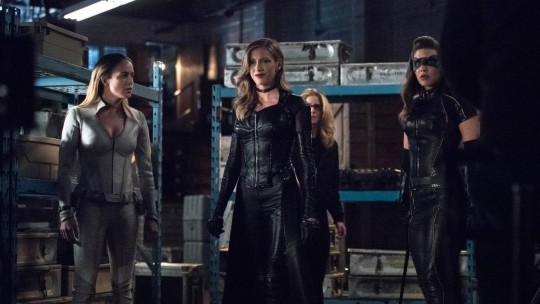
“Redemption isn’t a destination. It’s a journey.”
Oliver Queen plays second fiddle while the Canaries past, present, and future sing. Welcome to "Birds of Prey" part deux.
As we hurtle towards this season's conclusion, The Powers That Be are addressing all the markers laid down at the outset. First up is Laurel’s redemption arc.
The premise of the multiple Earths falls back on the age-old question of nature versus nurture. Take multiple people with identical genetics, give them different life experiences and watch what happens. Earth 2’s Laurel was as much of a Daddy’s Girl as our Laurel was. Losing her father at such a young age left her with a mountain of guilt and rage at the same moment she lost her moral compass. It’s not surprising she went down a very different path.
Yet all the ingredients were there for the Earth 1 Laurel. She just needed the love and understanding she missed on Earth 2. In walks Quentin, brimming with unconditional love and fatherly advice. And though the love may have been unconditional, it was of the tough love variety. He wore no glasses of any color and knew how damaged this version of Laurel was. He loved her anyway. And the brief time they shared gave Laurel the desire to be the person she might have been if her own father had lived. She may have assumed Earth 1’s Laurel’s identity in self-defense but it became a second chance. And she was determined to live up to what she thought Quentin wanted her to be. Earth 1 Laurel.
Emiko’s retribution just exposed the cracks already in existence. No amount of effort was ever going to transform this Laurel into the Earth 1 variety. She'd been through far too much. Besides, Laurel and Team Arrow may be allies but they were far from one happy family. After being framed for murder, Laurel decides she might as well live up to the hype.
Laurel’s ensuing crime spree only causes more divisions. While Oliver is open to giving Laurel the benefit of the doubt (she did get him released from prison) and the other male members of the team have no vested interest in the outcome, the same cannot be said for Dinah and Felicity. Their dueling opinions of Laurel are directly related to their interactions with her.
Dinah’s opinion of Laurel is colored by the fact that she is responsible for Vinnie’s death. Every action Laurel takes is weighed against that knowledge. Therefore, it is not surprising that when shown evidence Laurel may be responsible for someone else’s death, Dinah was quick to believe.
Felicity’s relationship with Laurel is the opposite. Laurel is the woman who brought Oliver home to her and kept her from crossing a line she would have regretted. Felicity is the only member of Team Arrow who has never taken a life (At least by comic book rules. Blowing up a building full of bad guys doesn’t seem to qualify and everyone seems to have forgotten Havenrock except Rory) and Laurel is the reason that still holds true. Felicity understands how easy it is to cross the line no matter how good your intentions may be and that doing bad things doesn’t always make you a bad person. She could never have married Oliver otherwise.
This is why Dinah and Felicity’s argument is so powerful. Neither person is wrong. As Dinah said, they did not create Black Siren and Laurel’s choices are her own. Yet Felicity was right about needing second chances. When they met Dinah, she was on a crusade that didn’t stop until everyone she believed responsible for Vinnie’s death was dead. Yet Oliver still welcomed her onto the team and helped her get back on to the police force. She literally would not be where she is if someone hadn't given her another chance.
This made Sara the bridge to all worlds. She has no love for this Laurel and no ax to grind. She’s also responsible for enough death and destruction to see Laurel’s side. Sara has no need for platitudes when she can speak to the harsh realities of a lived experience. You don’t get gold stars for effort. The struggle for redemption is a lifelong commitment.
This culminates with Felicity’s ultimatum. If Laurel’s going to kill again, then she may as well start with Felicity. Laurel may have made her peace with the death of hypothetical people somewhere but could not bring herself to kill the person who stood by her even as Laurel repeatedly tried to push her away. Felicity, like Quentin before her, cared about Laurel for who she was and not who she looked like. At the end of the day, Felicity returned the favor and pulled Laurel back from the edge but it was Sara that had the most impact. If Laurel truly wants to make amends, she needs to do it on her own Earth.
On the surface, the flash forward is about Galaxy One’s attempts to destroy the Canaries in their quest to take the Archer program global but it also serves as the coda to Laurel’s story. After multiple deaths, the Canaries are in full retreat which doesn’t sit well with Mia. If Galaxy One’s terminator has located all of the other Canary hideouts it’s only a matter of time till he finds their primary lair. Taking the fight to Galaxy One is the only option. In an effort to change her mind, Dinah explains that she created the Canaries in part because of her failure to support a friend in her time of need. It seems that amends were made all around. Laurel in the guise of the Black Canary arrives just in time to pull the young, arrogant, and foolish Mia’s butt out of the fire. Maybe she is her father’s daughter.
Laurel’s story may be the main plot of the episode but Oliver and Diggle’s side adventure contributes to the overarching plot of the season. How to stop Emiko and the Ninth Circle. Oliver hopes that if he can find the killer of Emiko’s mother, he’ll have leverage with Emiko. It is the desperate hope of a brother trying to save his sister. And normally it would never have worked. But it turns out that the only person left in the world that Emiko trusts may be behind the murder. Dante.
Is this a ploy to wrest the Ninth Circle back from her? He claims her lack of focus is causing concern among the other members of the Ninth Circle. I’m curious to know how he became her right hand in the first place. Criminal Organizations aren’t exactly known for their power-sharing tendencies.
I know I’ve mentioned the effects of diversity behind the camera affecting what’s seen in front of the camera but it bears repeating. An episode like this would never have occurred without a female showrunner. Being written and directed by women didn’t hurt either. It passed the Bechdel test with flying colors, while losing none of its ass-kicking comic book cred. Well done.
4 out 5 shadow suits
Parting Thoughts:
We may have said goodbye to Laurel in the present day; she may become the latest addition to the Earth 1 Star City Canaries.
Shadow Thief AKA Carl Sands was originally a supervillain for Hawkman. However, in the New 52 Shadow Thief was reinvented as Aviva Metuala, whose shadow suit could protect her from pain and harm, and could transform her limbs into weapons, among other things.
Quotes:
Shadow Thief: “I heard you traded in your leather for a power suit.”
Laurel: “Well, that suit didn’t really fit.”
Felicity: “Are you sure that you’re okay now that you know your sister’s evil and tried to kill you... Too soon?”
Felicity: “Not to toot my own horn but Emiko is more of the Karate Kid, Hillary Swank version, and I am more of the Mr. Robot version but prettier."
Mia: “I think we finally lost the son of a-- (explosion). Spoke too soon.”
Diggle: “Did Felicity tell you how she tracked the rifle to this apartment?”
Oliver: “Just call her a genius and leave it at that.”
Longbow Hunter: “You think an arrow’s going to stop me?”
Oliver: “I think a tranq arrow will.”
Laurel: “Aren’t you supposed to be on your little spaceship or something?”
Sara: “I took a break to clean up your mess.”
Dinah: “Laurel did not become Black Siren because we were bad friends, Felicity.”
Shadow Thief: “Which one was Felicity?”
Laurel: “The chatty one.”
Laurel: “So you’re a terrorist for hire?”
Shadow Thief: “I prefer a mercenary with perks.”
Felicity: “Well, I’m having deja vu in the best way possible.”
Sara: “Felicity Smoak is killing people now. I really have missed a lot.”
Felicity: “Fake heat signatures. That is devious and impressive.”
Mia: “It’s too bad I’m not a Canary.”
Felicity: “Forget about living up to Laurel’s legacy and forget being who Lance wanted you to be. What do you want?”
Sara: “We are pretty badass together.”
Felicity: “Yeah. Like a Birds of Justice.”
Sara: “Something like that.”
Felicity: “It was like Charlie’s Angels without the feathered hair and casual sexism.”
Shari loves sci-fi, fantasy, supernatural, and anything with a cape.
#Arrow#Green Arrow#Oliver Queen#Felicity Smoak#John Diggle#Sara Lance#DC Comics#Arrowverse#Arrow Reviews#Doux Reviews#TV Reviews
1 note
·
View note
Text
Meet Azrael / Death (Lucifer TV series related)
Okay, IF Lucifer gets picked up, one of the biggest rumors is that Azrael (Angel of Death) will be a character in season 4. This actually seems very likely.
Season 2 of Lucifer told us about Azrael in regard to how she works in the TV universe. Azrael is Lucifer’s sister and The Angel of Death. It was her sword that allowed Lucifer to cut a hole in reality so Mum could go off and create her own universe.
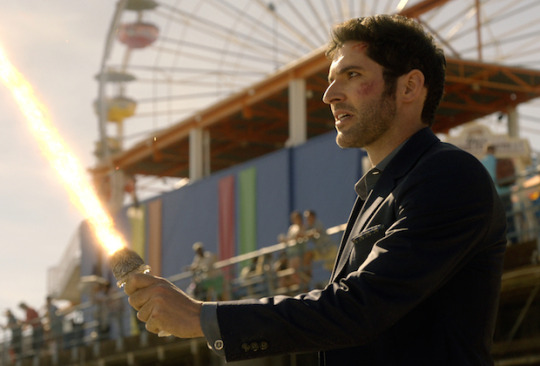
If season four happens, some of you may be curious to know who this character was in the Lucifer comic books.
Based on descriptions from Lucifer: Season 2, Azrael of the TV series is actually a combination of two characters.
Character 1: (Really only the source for the name) is The Azrael of lore (who is actually male or non-gender depending on your view of angels).
And
Character 2: The heavier influence. Death of The Endless created by Neil Gaiman (also creator of this version of Lucifer).
Death of the Endless is the living embodiment of Death incarnate. This character is who the Lucifer TV series version of Azrael seems most likely to have roots in.
Who is Death of The Endless?
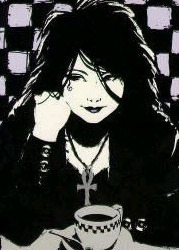
Continue reading for some information about the comic book version of Death.
The Endless are seven siblings who are God-like entities in Neil Gaiman’s Sandman Universe. They are anthropomorphic personifications, meaning they embody certain aspects of Sentient life. They are actually more powerful than most Gods but are less powerful than The Presence (The God that made Lucifer) and they are less powerful than Lucifer himself.
This was confirmed in the Sandman storyline called Season of Mists. The Sandman, himself, Morpheus AKA Dream of The Endless discusses Lucifer with his raven servant, Matthew.

The Endless are:
Destiny (male),
Death (Female),
Dream (male),
Destruction (male),
Desire (Genderfluid),
Despair (Female),
Delirium (Formerly known as Delight, female),
According to the message Morpheus (Dream) had Cain deliver to Lucifer in Sandman: Season of Mists, they are actually cousins of Lucifer and the angels.
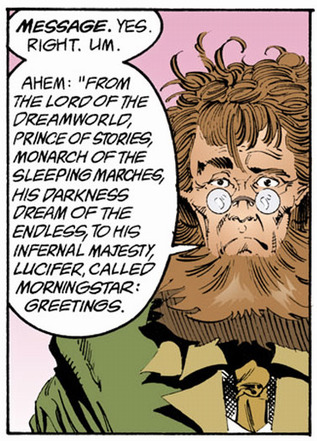
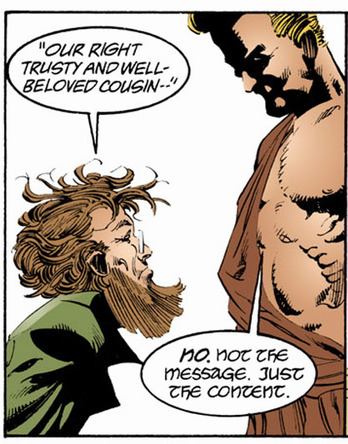

Death is actually the one Endless most like an angel as she does have wings of her own. Her wings are never shown in panel art but they are shown on the cover art of the issue of Sandman where she made her first appearance. “The Sound of her wings.” This is issue 8 of Sandman.

An audio play / motion comic version of The Sound of Her wings can be watched here.
youtube
https://www.youtube.com/watch?v=JHkqHsxqlHM
There is a non-Canon Manga that was published retelling Sandman: Season of Mists (the storyline where Lucifer quits ruling Hell) from Death’s point of view. It is called Death: At Death’s Door. You can see her wings in one page of that manga.
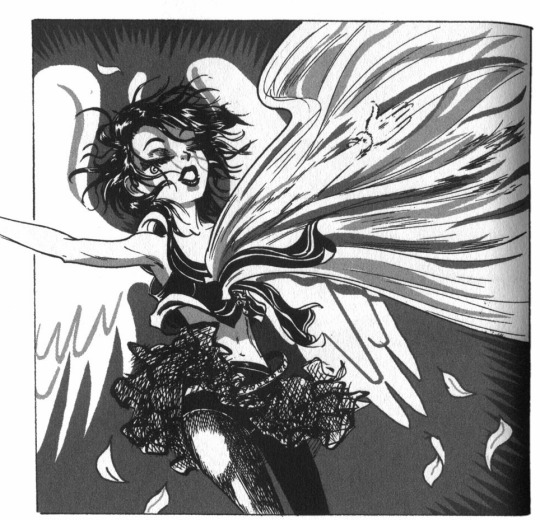
You never see Death’s wings in the panel art of the actual Sandman or Lucifer comics but Morpheus (Dream) can hear them (”The sound of her wings”).
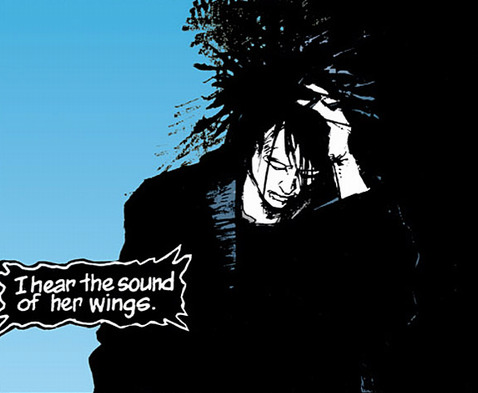
It is implied that perhaps only the dead can actually see her wings and she only unfurls them when delivering a soul to the afterlife.
The version of The Angel of Death that appeared in “American Horror Story: Asylum” might have been inspired by her.
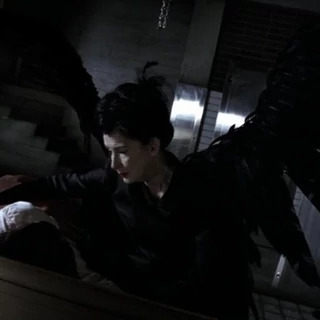
Death is also female in Mexican traditions.
There are multiple different afterlifes in Sandman, just like in American Gods.
Your afterlife is determined by your belief. Some people go to Heaven, some go to Hell, some are reincarnated, some go to the Elysium Fields while others might go to Tartarus, and yet others might go to Valhalla, ect...
Death physically resembles a nineteen-year-old Goth girl. Some of her own younger siblings actually look older than her. Dream, for example, is quite ageless, and most assuredly not a teenager. Sometimes he can seem young while other times he looks very old. It’s very hard to determine a specific age look for him.
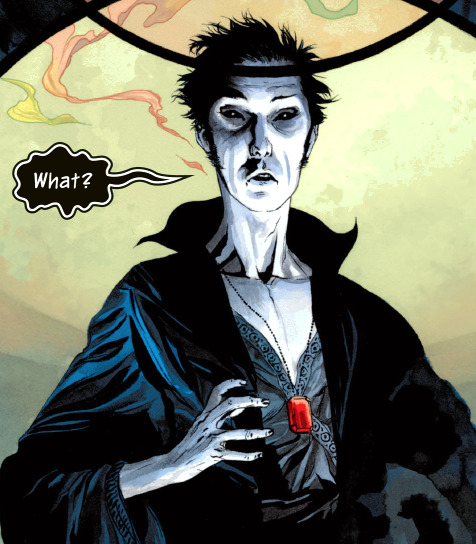
But he has never looked like a teenager.
Death is always seen with black hair and has grey-blue (human looking) eyes. She often wears a black tank top and black form fitting jeans with black ankle boots. She is very pale (though not as pale as Morpheus) and under her left eye are the markings of an Eye of Horus Tattoo.
Often she wears black gloves that end at her wrist and instead of a scythe she sometimes carries an umbrella. She’s very fond of Disney films, including Mary Poppins and The Little Mermaid. For the artwork of the comics her physical appearance was inspired by a real woman, a nineteen-year-old girl named Cinamon Hadley, just as Lucifer’s appearance was modeled after rock star, David Bowie.
Like Lucifer, Death is a psychopomp, meaning she can transport souls to the afterlife.
Despite her purpose of delivering souls to the afterlife, Death is not a depressed or depressing character. She is friendly, perky and kind hearted. Death would actually prefer it if you end up in a good afterlife. She doesn’t judge anyone and she tries to be a friend to everyone.
It was revealed that a long time ago, for a while, Death had become cold, until someone asked her how she would like it. Realizing she had mistreated the souls she was attending, Death decided to humble herself, and remind herself of what it is like for them to be mortal (since she had never been human). After this revelation, Death decided to turn herself human once a century to always remind herself why she should be kind, and what people experience while alive.
A story of one of Death’s human experiences can be found in the stand-alone comic, Death: The High cost of Living by Neil Gaiman, which is available in Death: The Deluxe edition.
Death tries to be a friend to all and values the virtues taught in Disney films such as friends, family, love, compassion, ect.
It is for this reason that I felt the show Lucifer dropped a ball by introducing Ella’s brother and not having a surprise reveal that Ella was Death / Azrael in disguise. She actually fits the personality very well.
Here is death in her appearance in DC’s Action Comics 894 in 2011 talking to Lex Luthor. The Endless and their stories are canon to DC comics and Vertigo and they transcend universes.
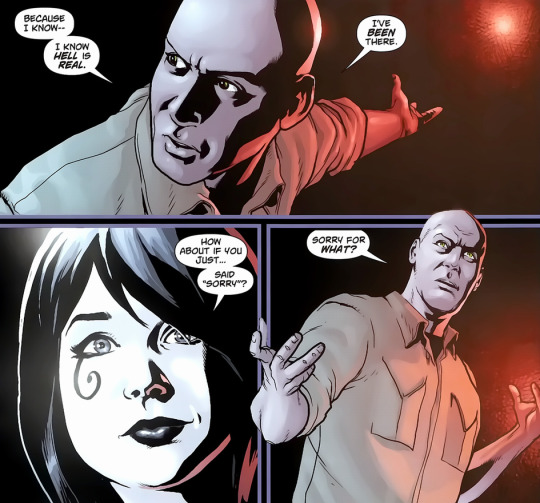
As I said, Death actually prefers it when you end up with a good afterlife.
Each one of The Endless has a sigil, a symbol which represents them. For Death this is her ankh, the Egyptian symbol of Eternal Life.

She wears an Ankh as a pendant. The necklace itself has no power but the symbol means the world to her. And her family can call out to her by drawing an ankh and addressing her, or clutching a representation of her ankh in front of a mirror in their personal gallery (Each of The Endless has a gallery room for communicating with each other when they are not in the same realm).
An occult organization called The Order of Ancient Mysteries tried to summon Death over a century ago and accidentally summoned her brother, Dream (Morpheus AKA The Sandman) instead. Despite realizing their mistake they chose to hold him prisoner for over seventy-two-years.
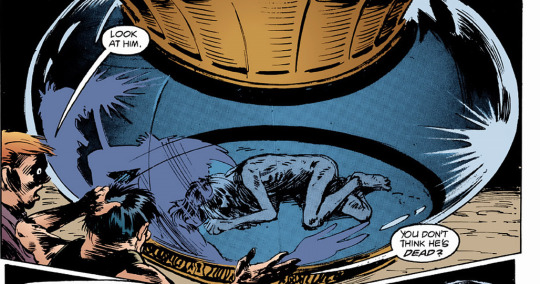
When Morpheus finally escaped his prison he had to track down items stolen from him during his imprisonment, including his pouch of dream sand (He is The Sandman after all), his helm (a creepy battle mask carved from the bones of dead Old Gods), and his ruby dreamstone amulet. This was actually the very first storyline in The Sandman comics. Preludes and Nocturnes. Death’s first comic book appearance was toward the end of this storyline.
It is also during Preludes and Nocturnes that we see Lucifer for the first time in issue 4 of Sandman, “A Hope in Hell.” Morpheus (Dream) had to travel to Hell to retrieve his stolen helm. It is not until Sandman: Season of Mists that Lucifer quits ruling Hell like in the TV show Lucifer.
Death is not just present at the moment someone dies but also is there at births as well. Destruction of The Endless had a theory that all of The Endless actually represent a thing and it’s opposite. Desire is also hate, Dream is also reality as dreams can influence reality, Death is also life, Despair (whether she means to or not) also represents Hope, ect...
In Sandman: Endless Nights, there is a story set in the distant past where Despair spoke with the humanoid embodiment of Krypton’s sun and suggested that Krypton should bear life even though the planet was doomed to die. Despair felt that that it would be glorious if when Krypton died only one survivor was left to to mourn and grieve. Without meaning to, she orchestrated the creation of Superman, a living symbol of Hope.
Considering Death has wings and is a cousin of Lucifer, it actually makes sense that the Lucifer TV series appeared to have merged her with Azrael the angel of Death and turned her into Lucifer’s sibling.
As the embodiment of Desire is one of The Endless (one of Death’s actual siblings), it actually seems even more fitting. (”What do you Desire?”)
Death made an appearance in Lucifer’s solo comics.
Death appeared in Lucifer Volume 1 issue 25 and 26.

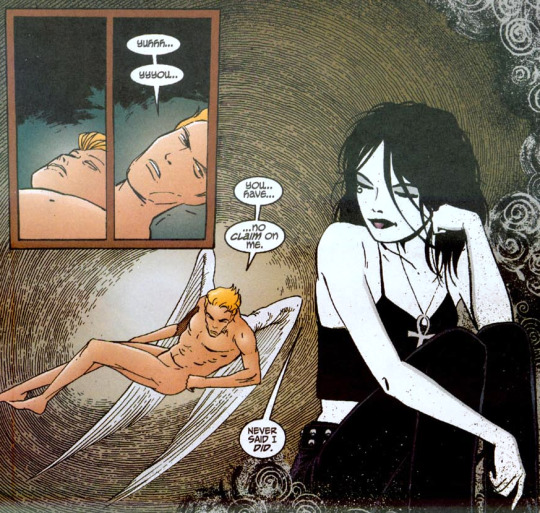
Neil Gaiman’s version of Death is actually a very well loved comic book character and is probably the most popular character in all of Sandman lore. There are people who would argue that she is more popular than Morpheus (Dream AKA The Sandman), himself.
Aurelio Voltaire even wrote a song about her for a Neil Gaiman tribute album called “Where’s Neil when you need him?” The song is called Sweet Death.
youtube
He also wrote a song from Lucifer’s point of view called Almost Human (on the album of the same name.)
youtube
Death was even the narrator of a safe sex / AIDS awareness pamphlet published by Vertigo comics in the early 90s that even featured her demonstrating how to properly put on a condom using a banana provided by John Constantine. It was called “Death talks about life.” It’s now available as bonus material in the Death Deluxe edition collection.
Here’s hoping that if the Lucifer TV series is picked up and Azrael (based on Death of The Endless) makes her appearance that she’s a little more accurate to her personality of the comics than poor Cain was...
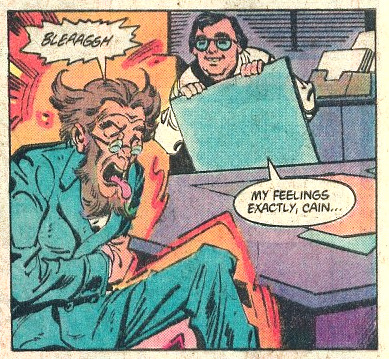
#Lucifer#Lucifer on Fox#Fox's Lucifer#Death#Death of The Endless#Azrael#Lucifer Morningstar#Sandman#The Sandman#Sandman Universe#The Sandman Universe
37 notes
·
View notes
Text
Information
Apperance;
Natsu is a lean, muscular young man of average height with a slightly tan skin tone, black eyes, spiky pink-colored hair, and has abnormal sharp canines; Natsu has a scar on the right side of his neck, hidden by his scarf.Following his intense battle with the Rogue Cheney of the future, Natsu gains a cross-shaped scar on the left side of his abdomen, a result of the two fatal wounds the man dealt to him during their altercations.[12] He later attains a new scar, this one being a jagged blemish on his right cheek, which he gained following his battle with Zeref. Natsu's guild mark is red and is located just below his right shoulder
Natsu's main outfit consists of a sleeveless, gold trimmed, black waistcoat, often left open and untucked, exposing his bare chest, a gold trimmed, black cloth around his waist that reaches his knees, held by a leather brown belt with an oval-shaped silver buckle, white knee-length trousers with black ribbon ties, a thick black wristband on his left wrist, black open-toed sandals and the scale-patterned scarf he received from his adoptive father, Igneel. He has also been known to wear a rolled up comforter strapped across his back, though he rarely carries it in battle.
Personality;
Natsu is carefree and reckless in nature, and, despite his consistent brawls with the other members of Fairy Tail, he is a fiercely loyal and protective friend. He is willing to go down fighting for his friends, regardless of how futile it might seem. Natsu has a straightforward mind, and often tackles issues with a "hands on" approach. His solution to problems often involve violence. Even when disrespected or faced with obvious hostility, Natsu rarely ever reciprocates the feelings, and often forgoes grudge-holding. He did, however, for a short time, hold a grudge against Jellal Fernandes, but eventually forgave him and considered him an ally. He occasionally shows compassion for his enemies, such as when Cobra was betrayed by Brain. Natsu rarely exhibits any perverse tendencies towards the opposite sex, there only being two noted instances. The first is seen prior to the Grand Magic Games, when he is seen trying to peek, along with several other of his male Guild mates, on the women as they bathed. The second is when Lucy comes crashing into him while nude, and he stares at her body, even groping her breasts for a moment.
Natsu continuously tries to prove his strength to others. At various points in time, he has challenged Erza, Laxus,Mirajane, and even Gildarts (in short, all of Fairy Tail's current S-Class Mages), to fight him, albeit, he was beaten every single time. Despite his losses, Natsu bears them no ill will, as he considers everyone in the guild to be his family. He demonstrates this attitude even towards former enemies. Natsu has even gone as far as defending Laxus from being expelled, despite his attempt at taking over the guild.[35] Due to his reckless nature, Natsu's fights usually ends with widespread destruction. Natsu's love of fighting has allowed him to develop a rather strategic mind, helping him to, on various occasions, find weaknesses in his opponent's techniques, or simply weaknesses his opponents themselves possess. Natsu has also defeated his opponents with pure wit, rather than brute strength. Natsu, befitting his recklessness and love of fighting, never backs out of a fight.
Natsu was very close to Lisanna, and, because of this, after her supposed death, no one in Fairy Tail mentioned her out of respect for his feelings. However, after Lisanna's return to Earth Land from Edolas, this is no longer the case.
As a Dragon Slayer, Natsu suffers from motion sickness. Natsu becomes sick from riding on any form of transportation, even if the transportation happens to be other people, as shown when he was carried by Lucy. This, however, does not apply to Happy,[40] as he considers him family, not transportation. Natsu can become sick from looking at, or simply thinking about, any form of transportation. In spite of his naturally dense nature, Natsu is quite perceptive and understanding of his friend's feelings. After his battle with Gildarts during the S-Class Mage Promotion Trial, Natsu came to understand and accept fear, and has used this acceptance to help his guildmates and himself emotionally grow. Prior to this event, Erza’s wrath (albeit for comic relief), transportation, and the Magic Council were the only things that Natsu feared.
Magic And Ablities
Fire Dragon's Roar (火竜の咆哮 Karyū no Hōkō): Natsu's signature Dragon's Roar in which he quickly gathers and releases a large quantity of flames from his mouth at his target.In X792, Natsu's mastery over this spell allows him to create a continuous stream of flames that appears as a wall of fire across a field.
Fire Dragon's Claw (火竜の鉤爪 Karyū no Kagizume): Natsu ignites his feet in flames, thereby increasing the power of his kicks. The flames can also be used for jet-propulsion purposes.
Fire Dragon's Iron Fist (火竜の鉄拳 Karyū no Tekken): Natsu engulfs his fists in flames and punches the target. While he was wearing a cat mask, Natsu renamed this ability Cat Fire (猫ファイアー Neko Faiā)
Fire Dragon's Wing Attack (火竜の翼撃 Karyū no Yokugeki): Natsu rushes towards his target and grabs them, before subsequently setting hands ablaze, sending them flying.
Fire Dragon's Sword Horn (火竜の剣角 Karyū no Kenkaku): Natsu lights his entire body ablaze and headbutts the target at a high speed.
Fire Dragon's Brilliant Flame (火竜の煌炎 Karyū no Kōen): Natsu ignites both his hands in flames and then brings them together, creating a fiery explosion. In the anime, rather than generating an explosion, Natsu creates a large fireball to throw at his enemies.
Fire Dragon's Flame Elbow (火竜の炎肘 Karyū no Enchū): Natsu creates a stream of fire from his elbow, propelling him forward and increasing the strength of his punches.
Fire Dragon's Crushing Fang (火竜の砕牙 Karyū no Saiga): With his hand lit ablaze, Natsu swipes at the target in a claw-like fashion, burning them.
Fire Dragon's Grip Strike (火竜の握撃 Karyū no Akugeki): Grabbing his enemy and supporting his arm with his other, Natsu blasts the foe at point blank range.
Fire Dragon's Roasting Bath (火竜の湯沸かし Karyū no Yuwakashi): Natsu engulfs his entire body in flames to heat up the surrounding area. This is powerful enough to make water reach scalding temperatures.
Crimson Lotus: Fire Dragon's Fist (紅蓮火竜拳 Guren Karyūken): Natsu rapidly punches his target, with his hands lit ablaze, creating a fiery explosion after each subsequent contact. Such a spell was shown to be able to defeat Gajeel Redfox, the Iron Dragon Slayer, who, at the time, was utilizing his Iron Dragon's Scales, and destroy the entire Phantom Lord Guild Building. In the anime, Natsu also used this spell to defeat Erigor.
Crimson Lotus: Exploding Flame Blade (紅蓮爆炎刃 Guren Bakuenjin): Natsu swipes his arms in a circular fashion, creating a powerful, and highly destructive, torrent of flames that barrages his target. Natsu habitually uses this spell as a finishing move, having employed against Laxus Dreyar at the end of their battle, used against Gildarts Clive as a finisher, which, notably, caused the mighty Mage to take a few steps back, and once more against Sting Eucliffe and Rogue Cheney, with which he completely overpowered the two, who were in Dragon Force, defeating them
Dragon God's Brilliant Flame (竜神の煌炎 Ryūjin no Kōen): An alternate version of Fire Dragon's Brilliant Flame, Natsu engulfs one hand in the flames from his Fire Dragon Slayer Magic, and the other in flames from Fire God Slayer Magic, and brings the two flames together, generating a highly destructive blast that is capable of destroying a large area, and defeating Zancrow, a member of the Seven Kin of Purgatory in one hit.
Planetary Flames: Exploding Flame Blade: An enhanced version of Crimson Lotus: Exploding Flame Blade. After consuming the core of Eclipsed Celestial Spirit King, the user ignites their fists with fire, as well as the aforementioned consumed energy, and then throws it towards their desired target, creating explosions upon colliding.
—————————————————————
Scoue; fairytail.wikia.com/wiki/Natsu_Dragneel
2 notes
·
View notes
Text
... Somehow, Still Talking About This Captain America Shit (Now With Bonus Spider-Man and Agents of SHIELD)
So now Secret Empire has revealed its Shyamalan Twist and given the readers a Good Guy Steve Rogers as well as Hydra Cap, and the kinds of dickbags who, when this whole bullshit began were dismissing people’s complaints with “oh come on, don’t you know how comics works, it’s all going to be put back at the end, blah blah blah...” are crowing I-Told-You-So’s.
But here’s the thing:
Yeah, fucknuts. We always knew this.
People were never upset because we thought suddenly, for the first time in comics history, a major publisher would decide to throw one of its foundational heroes in the garbage bin and leave it that way. We always, always knew that they’d walk this shit back. Find my earlier posts where I specifically talk about how they’re going to do that (and why it’s still going to stain the character for ages, possibly permanently).
People were upset because you took a shit on the character they came to read, and who means something to a lot of people.
See, Cap’s not cool. Captain America is not hip. Nobody’s putting the goofy flag costume on the list of “most badass looks in comics” or anything. His super powers are not flashy or even terribly impressive against the lineup of Marvel’s other premier characters: he’s pretty strong (again, not all that strong comparatively), and he has a shield that he can throw. That’s it. Those are not top-tier powers, and from an objective viewpoint, they’re barely putting him above Hawkeye if you wanted to do power rankings for the Avengers.
Because those aren’t his real superpowers.
His real superpower is his moral center. As Tony says in The Avengers, he’s a living legend who lives up to the legend. Tony’s not talking about Steve fighting some mind-controlled bad guys to get to a switch on the helicarrier, or punching Chitauri. He’s talking about the way Steve inspires people - the way Steve’s sincerity and certainty in doing the right thing, defending people, and standing against wrong makes other people want to be better. Captain America has never been a symbol of blind patriotism, but of the better nature of the U.S., and of people in general. Someone else online, I forget who (possibly someone at the Mary Sue? maybe a different tumblr?) said Cap’s superpower is being right, but while kind of true I don’t think that’s quite it. Cap’s superpower is doing good, and making other people believe, even for a moment, that they can, too.
Which, in a way, is a trait he shares with Spider-Man (and, I’d argue, is now a thing we’re seeing in Ms. Marvel and Squirrel Girl). Lots of heroes are inspirations to people in comics, textually, but Spider-Man, like Cap, has been shown in-comic to be someone the other heroes of the Marvel Universe recognize as a kind of moral anchor, someone who’s going to do the right thing, even if it’s the hard thing - or the dumb thing. Even if it costs him everything, and even if there’s an easier way. The big difference between the two is that Pete will fuck up a few times first, but that’s because Pete’s other core character trait is being a fuck up.
That brings me to a compare-and-contrast I wanted to make. Obviously, a lot of people are hating the Hydra Cap/Secret Empire story. A lot of people hated the Clone Saga in Spider-Man. Not nearly as many people hated the Superior Spider-Man arc. I think I know why.
See, the Clone Saga’s biggest flaw, the thing that sticks in everybody’s teeth when they read it (aside from the actual bad writing and plot spiraling out of control) is that the Clone Saga tried to tell the readers that their Spider-Man wasn’t real. Peter Parker, the one you’d been reading for years, wasn’t the real guy, he was a clone, and the real Peter Parker had been off somewhere else, living a different life, as Ben Reilly. Now, obviously nothing is “real” in comics, but the problem here is that this story then tries to set up the character the readers care about as the unwitting impostor, an intruder into a life that doesn’t belong to them, and then went so far as to suggest this Ben Reilly should get that life.
At its core, the Clone Saga tried to say, “the wrong guy is wearing the suit, and suit’s what matters.” It tried to tell the readers what they loved and cared about, and the audience rejected that.
Now, contrast that with Superior Spider-Man. Here, Doc Ock’s mind is living in Pete’s body. I’m sure there’s a good number of people who don’t like this arc, but I’ve never seen it generate the ire of the Clone Saga. I think this is because it doesn’t do what I just illustrated above. At no point does it say, “Hey, look, Doc Ock’s a superior Spider-Man, he should be Spider-Man now.” Doc Ock definitely says that, but the entire story is about him failing at it. The whole point of the story is that while he’s more efficient, a more vicious fighter, more ruthless in the pursuit of goals, and more focused on direct progress in the aspects of Pete’s life that he’s usually bad at (he finishes Pete’s doctorate and gets a girlfriend), he’s ultimately not as good a Spider-Man. The power of Spider-Man isn’t, at the end of the day, in the web-swinging and wall-crawling, but in Pete’s goodness. The things that make Spider-Man great are the things that Flash Thompson cites as inspirational - he never quits, he always keeps going, he always does the right thing, no matter if everyone in New York hates him, no matter if he never gets thanks. He’s going to go out there and try to do good, and stop people from getting hurt. Pete’s a fuck up, and there are things the Doc Ock does as Spider-Man that could increase the good he can do, but by the end of the story it’s clear that Doc, lacking Pete’s moral compass and heart, can’t be better at being that inspiration to others. He can’t be your Friendly Neighborhood Spider-Man, and while he does certain practical things better than Pete did, he also ruins (or risks) a lot of the personal connections Pete has built up over the years by virtue of being the fundamentally good person that he is.
That’s the key: Superior Spider-Man used a villainous character in the role of the hero we love to examine why we love that hero, and why it’s the person, not the suit and powers, that make them the hero we love. And it did so without ever trying to sell us on any bullshit “this is how things are now and forever and what you used to read and love is a lie” nonsense.
And that’s where Secret Empire and all this Hydra Cap stuff falls on its face. Even if you put aside all the ways the real world history of the character and the politics makes the whole thing gross as hell (for which, see all my previous posts), it doesn’t really work as a character examination. It doesn’t show us something about the character. We get Steve pushing people out of planes and plotting government takeovers, and instead of some substantive reason why Steve is villainous, we get “well, he was actually always like this but Cosmic Cube”. That’s not a reason, Nick. That’s a handwave.
You want “moral center character goes horrifically evil” as a story that does a great examination of the character in the process? Look to this past season of Agents of SHIELD, where Framework Fitz is the Mengele-like second to Madame Hydra. They don’t just show us Evil Murder Doctor Fitz and treat that as a good story because WHAT A TWIST, they ask the question: how could our Fitz do such things? And they answer it, not with “Framework!”, but actual character development: Framework Fitz was raised by his shitstain of a father, who abused him and inculcated in him a truly poisonous morality that prioritized strength and ruthlessness over compassion - and his desire to do right and be loved by the people who matter to him (his father, Ophelia) leads him to go down this dark road, believing it to be right. So when they finally escape the Framework, Fitz has to actually deal with the fact that he’s capable of those things, because he now knows that the things that make him good could be corrupted.
I mean, fuck, Superman: Red Son did this bit better than this Hydra Cap nonsense, and that was kind of trash itself.
So, this whole Hydra Cap thing doesn’t actually serve to show us why we care about Steve, nor does it have anything interesting to say about how someone of Steve’s moral character could lose their way and become evil, and it is plagued by attempts to insist that this is the truth and it’s always been this way and this is how it’s going to be now and no really we’re serious. It’s trying to Clone Saga we the readers, while being super disrespectful to the character, and showing us nothing new in return.
And the apparent payoff after all this controversy, it seems, is that the whole thing is an even crappier version of that dumb Star Trek TOS episode where Kirk gets split into his good and bad sides by the transporter.
Boy, all this ill will, insulting your audience, bad PR, reader walkaways, cloud of antisemitism, and actual fucking Nazis adopting Cap as a symbol sure were worth such a bold, original story.
You dumb fucks.
2K notes
·
View notes
Photo

Humanity's Love Affair with the Sociopath
Sigh. This one's been a long time coming, I've been putting it off because it's such a big topic, but I need to talk about it eventually because it's at the core of everything I've ever talked about. It's my problem with the Zeitgeist, and with contemporary society today. It's my beef, it grins my gears, and it's something you've never asked yourself.
Why do you love sociopaths?
The media is partly to blame, it always is. We've seen an evolution of character types across the decades, from the friendly person with the heart of gold from the idealistic '80s doing all it can to avoid the inherent, inborn corruption of humanity, to the more earnest depiction of an abrasive, incredibly cynical person with a heart of gold from the '90s. From Ninja Turtles to John Constantine, they all had something in common.
They had a heart. They all had compassion, empathy, and no matter how cynical some of those '90s characters could get, underneath it all there was still a basic belief in humanity. A compassion that drove them to always do the right thing despite their bitterness at an uncaring world, an untainted moral compass that never swerved away from wanting what was best. For everyone, with no one left out. An end to the suffering people unjustly endured at the hands of those without a soul.
At some point, we started cheering on the villain. The abyssal creature without a soul, the demonic presence that had no heart to speak of, never you mind one of stone. It became so 'kewl' to be the con man, robbing old ladies for all their worth, spitting on the heroic figures who'd heretofore showed children the consequences of such actions.
It all comes down to the rise of extraversion and how it's tainted to its very core. It might sound like a horrible way to think, but there's just too much evidence to support it and there's going to be a lot of that in this post. I've learned that it isn't 'Humanity are Bastards,' as the trope goes, but rather 'Extraverts are Bloody Psychopaths,' just within varying degrees.
Why do you think the Nigerian scam mails worked? Affiliative extraverts thought themselves clever, they'd 'play' the poor prince, get him to open up and trust them so that they could get that big, juicy slice of money. And then? They'd not give it back! 10 per cent! Why have such a meagre pittance when you could take this 'innocent prince' for all he's worth? What a lark, take that silly sod to the cleaners for trusting you!
Didn't work out that way, eh extraverts?
As good as extraverts think they are at 'playing the game,' sociopaths are a billion times better. And affiliative extraverts seem almost wired to fall for it. It might be a survival instinct to obey the strongest, and thus be seeen as such by proxy, so sociopathic behaviour is desirable because it exudes airs of 'strength.' Even when that 'strength' gets your bank account cleaned out because you thought you were being bloody clever.
Instead of falling arse over tit for a stupid, stupid con.
It's why we have cults of personality... right? Just the affiliatives trying to emulate the 'strong,' trying to be 'strong' by proxy. All looking to the 'strong' for guidance, for will, to do what they bloody can't. Trying to behave like them in order to gain favour. Whether it's Steve Jobs, Donald Trump, or any charismatic sack of ichorous waste, whatever the Wastrel of the Day is, if they're manipulative enough, the affiliatives will follow.
It happens on all kinds of scales. All kinds. You'd have to be the world's shiniest example of a Joe bloody Soap to not see it, and people don't. These cults of personality pop up everywhere. And I have to pick out an obscure favourite of mine so that people won't be too invested in it, if you're seeing this from an outside perspective, you might actually catch on. So, what manner of dirtbag is going to serve as my example?
I'm going to use one that was never of criminal intent, though a generally scummy person nonetheless. Chris Avellone. In video game circles you might have heard of him, most do I'd think, and they worship him without even really knowing why. Why? Well, he's a sociopath, isn't he? Anyone with the brass clackers enough to lead a cult of personality always is.
Nature of the beast.
What'd he do? Let's see. He wrote a Fallout Bible and claimed to have absolute creative veto over the IP, for one thing. If a designer or writer had anything contradictory to say on the matter? He'd passive-aggressively mock them in his 'Bible.' That he called it a bible is more than a bit telling, don't you think? That's not indicative of off the charts narcissistic arrogance at all. Oh no, not even a little bit. No, no...
So let's look at the characters he's proud of including in video games, shall we? Kreia, from Knights of the Old Republic: A soapbox for Avellone's seedy, unbalanced views and a sociopath. Ulyssess, from New Vegas: See Kreia. Weeping Mother, from Pillars of Eternity: See Kreia. Sensing a pattern, yet? Ulysses wanted to nuke everyone back into a fresh apocalyptic state, it's what humanity deserved, he just wanted to watch them burn.
Avellone has often said that that's what he'd wish for the Fallout franchise. That's not worrying at all, right? Okay, how about how in a recent interview, with all of the cocksure arrogance of a sociopath, he told an interviewer that he prefers 'smart evil?' He'd prefer to 'talk two people into killing one another' rather than actually save anyone. Or Tyranny, which was Avellone's brainchild? That was a world of villainy and evil, lead by sociopaths... Cor, have to wonder if you're sensing a pattern yet. I am.
Oh, and he took an ending out of a game that allowed a group of sapient creatures a future, and a chance at happiness. Why? They weren't human, he believed that their purpose in the story was to die and suffer. Oh yes, did I mention that Avellone is a bit of a crackpot?
And yet people love him.
So, let's move onto a fictional example. Rocket Raccoon was originally an abrasive character with a heart of gold, much like John Constantine. I adored him. That's when he was written by Dan Abnett and Andy Lanning. Did you know that Rocket had a different origin than the dreary rot the films put him through? He was originally a fluffy artificial life form created to help the mentally disabled and disturbed. In DnA's run on Guardians of the Galaxy, Rocket was a really nice fellah, reliable, and a genius. Definitely a bit rough around the edges, to be sure, but a stand up bloke nonetheless.
So, Rocket Raccoon is handed over to Bendis. Brian Michael Bendis...
Brian "Misogyny'n snuff porn is my bag, yo!" Bendis. Brian "I think it's super funny when Elektra gets kicked hard in the vagina by a guy, especially when the onomatopoeia is FOOM!" Bendis. Brian "If a woman didn't get shot in the head in this issue, I didn't write it!" Bendis. Brian "I hate Grant Morrison and Alan Moore just because they're British and that scares me!" Bendis. Brian "It's so funny whenever Tigra gets humiliated, stripped down, forced to do naughty things on camera, and then gets brutally raped by white villains. 'Cause I hate her and that makes it funny! Hehe!" Bendis. Brian "When I write Doctor Doom, he gets to call a woman a 'fat cow whore' and it's totally in character!" Michael God Damn Fucking Bendis.
So, yes, Bendis is also a sociopath. We won't talk about that, here, though. I think I've already covered my grievances above well enough. Suffice it to say though that this man has a history of being shitty to women in comics. And you can probably guess what happens to Rocket, right? Rocket is now a misogynistic sociopath. Hooray. He's a massive arsehole. And not the kind that has a heart of gold, of course. Oh no, not even slightly. He's just a humongous pile of shit.
Cheers, Bendis. You desperate, oversexed and sexually frustrated tosspot. I don't want to be around for the next character you drag over hot coals. That, loves, is why I no longer 'Make Mine Marvel.' More like, 'Take Thine Garble... and shove it where the sun don't shine!' I'm sorry, I have to be facetious, I can't make it through this any other way.
The world is just obsessed with sociopathy.
Take a running kick at a cat's skull to post up on Youtube? Haha, it's funny! Grab a dolphin out of its water, toss it around and abuse it on camera for the purpose of selfies? It's fiiine! When did we start excusing this kind of shit? When did we begin to turn a blind eye? When did it become okay for some charismatic, inbred pigfucker to ruin Britain for everyo--Okay, now I'm getting too specific, aren't I?
That's the truth of it, though. All it takes is charisma and a Machiavellian mind and you can get away with anything! You can be the world's biggest dickhole and people will just cheer you on, no matter what you do! It doesn't matter who gets hurt in the process, does it? And that's where this pus-filled bubo on the face of humanity I 'affectionately' call the Alt-Blight rose from. This is the kind of hell we're living in where somone can have people genuinely think they're hot shit and the greatest new thing since sliced bloody bread for driving a car into a crowd of peaceful protestors!
HOW IS THIS HAPPENING TO THE WORLD???
I come back to Rocket Raccoon in my head. A fluffy critter made to help out the mentally infirm and troubled, reinvented in this cool, hip new age of rabid sociopathy to be a psychopathic, crazy cyborg killer. Why?
Why any of this?
Extraverts.
It's the conclusion I keep coming to and the one I can never get away from. It's what I pointed out when I linked that video from Mike Rowlands just a li'l bit back where he was pointing out how an Alt-Blight arsehat was being a filthy, pathological liar. In one shot, putting on a sob story about how his ilk are just 'peaceful,' not at all violent like the left, and so unfairly 'persecuted for having wrong opinions,' boo-hoo; In another shot, shown counting and bragging about his many, many, many guns.
Extraverts are enablers. They're a hoard, a hive, a buzzing little collective of workers that empower sociopaths by being taken in by them, granting these nutcases power beyond reckoning through their sheer numbers. This is how Trump happened, becasue affiliative extraverts are so easily brainwashed, conditioned, and tricked. All you have to do is convince them they're being clever, that they're in the 'in crowd,' that their chosen social tribe is the most hip, happenin', 'kewl' one out there? And they will, each and every one, collectively swear a holy blood oath to a known murderer.
And thanks to that, we're in a position where it's 'cool' to be a sociopath, psychopath, or other kind of crazy. it's 'seductive,' it's 'hot,' it's 'alluring,' it's 'pull your heads out of your fucking arses.' This isn't Twilight. It's 'strong,' it's 'powerful,' it's 'money,' it's 'stop being so damn deluded while the world dies around you.' With readily denied real issues rotting the world we live on, like global warming and overpopulation, this earth's not going to be around much longer. So why?
Why?
Do you just not care about your children? At all? Or your grand kids?
You bunch of bloody soggy-brained lunatics. That's all I can really say on the matter, isn't it? Singing and dancing while the world burns around you. You bloody lunatics.
I'm just going to talk a liittle about something personal that means a bit to me before I wrap this up. It's even managed to invade the furry community, to worrying degrees. When the Internet was younger, when there were few extraverts (because the Internet was wickedly complicated and they'd not the salted noodles enough to figure it out), the furry fandom was such a genuinely lovely place. It was. You should've seen Furcadia at its height, it was lovely. There were these little communities hosted on servers called MUCKS where fantastically brilliant, singular people got together to dream and imagine things only the brightest furry minds would.
It's why there were a lot of furries involved in video game development in the '90s and early '00s, you know? True story. Look into it. Dr. Cat is but one example. Anyway, it was good. And now? The Alt-Blight have invaded these MUCKs, chased all of the light and wonder away, so these are now tainted, festering hellholes of hatred. It's bizarre to walk through them again and, crestfallen, see how that cancer has made them sick with bile.
Even furries now have to deal with the Alt-Blight. I'm sure a lot of furries might think it's cool. That's the friggernaffin' Zeitgeist, isn't it? Sociopathy is so cool, hot, powerful, and sexy, and a giant taintfest of hatred, let's please never forget that part. It's a very important part, I think.
So it's everywhere. I feel like it's overtaking everything that ever meant something to me. So this is a fight. It has to be. In its own way, this is a war. This is the most abstract war anyone's ever fought. It's a war fought by abstracts against abstracts. It's a war fought against hatred, by compassion; It's a war fought against intolerance, by acceptance; It's a war fought against arrogance, by knowledge; It's a war fought against propaganda, by independent thought; It's a war fought against collectivism, by creativity; It's a war fought against the worst of us, by the best of us.
So, you know. I might be an abrasive buttface, and that's fine, because my heart's always in the right place. I'm not a misogynist, I don't abuse animals, I'm hardly about to run a car into a crowd of people... I think this defines the very opposite of who I am. I've chosen my side. I think that's something we all have to do, now, because it's necessary. Because this is happening and we're not going to be able to hide our heads in the sand any longer.
I get to choose to be 'a poncy, SJW, politically correct sissboy' or... well, a monster. An actual monster. Which is what they are. It might be evangelical, but it's how we have to look at the world, now. So I'm proud to be an SJW, I've said it in the past. I couldn't be more proud, I couldn't be happier! I derive great personal worth from this, because I'm not a monster.
Monsters of yore might have had scales or fur, they might've been fifty stories tall or come in flying saucers. The monster of today has white skin, they're not that tall, either, and they certainly didn't arrive in flying saucers. No, these monsters are home-grown. They're our monsters. And we have to recognise them as such.
If you see a Nazi, say Nazi. That's what every sociopath, psychopath, and associated nutjob out there is going to be. The Alt-Blight, what have you? Nazi. Even ex-neo Nazis will tell you that the Alt-Blight are Nazis.
So can we stop glorifying and empowering monsters now, please?
This is a dark time in history, one of those things where the younger generations will look back and shake their heads in such terrible shame. So let's come out swinging and put this Nazi blight to rest. Once and for all.
Citations
Abused Cat
Abused Dolphin
Avellone Prefers Sociopathy
Example of Bendis's Sociopathy
Alt-Blight Furry Troubles
Alt-Blight MUCK Taint
Alt-Blight Brainwashing
0 notes